



PARASHAT TAZRIA
SHABBAT: BEGINS ENDS
London 19:38 20:43
Manchester 19:50 21:00
Leeds 19:45 21:02
Liverpool 19:50 21:06
Birmingham 19:43 20:53
Antwerp 20:16 21:29
Bournemouth 19:40 20:53
Gateshead 19:47 21:07
Jerusalem 18:30 19:45






SHABBAT: BEGINS ENDS
London 19:38 20:43
Manchester 19:50 21:00
Leeds 19:45 21:02
Liverpool 19:50 21:06
Birmingham 19:43 20:53
Antwerp 20:16 21:29
Bournemouth 19:40 20:53
Gateshead 19:47 21:07
Jerusalem 18:30 19:45

Israeli media reported last night that the country is preparing for an imminent war with Iran. Schools have been told by the Ministry of Education to instruct students to take books home for Pesach, and have today given ‘zoom’ passwords as they expect schools to be closed indefinitely.
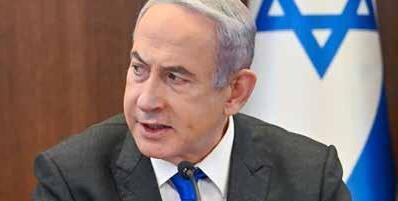
The Ministry of Health has also in- structed hospitals to move primary operations to hardened operating rooms, particularly in the north.
US President Joe Biden vowed to protect Israel’s security from Iran and its proxies.
Defence Minister Yoav Gallant last night

no breakthrough in hostage negotiations and world leaders voicing concerns over civilian casualties. But with Hamas rejecting Israel’s latest ceasefire proposal, growing protests against Netanyahu and political threats to
This will happen; there is a date.”
The IDF have withdrawn from Khan Younis but targeted strikes continue.
News outlets reported yesterday that three sons of Hamas senior leader Ismail Haniyeh were killed in a car on route to launch an attack.
Continued on page 6
See page 19








Former Home Secretary Suella Braverman has rejected accusations Israel has breached international law or committed genocide in its six-month military campaign in Gaza.
In an in-depth LBC interview on Nick Ferrari’s Breakfast show on Tuesday, Braverman, who recently returned from Israel, her first visit since the October 7 massacre by Hamas, resolutely defended Israel Defence Forces’ operational actions. She also spoke about the danger of Iran.
Braverman initially addressed her Israel trip: “There has been a huge amount of pain and destruction wreaked on Israel by Hamas, a death cult, a terrorist organisation intent on killing the Jewish people and destroying Israel.” She added: “Israel is fighting a battle on its southern border in Gaza but in the north since 10/7 alone 4,000 rockets have been fired into Israel by Hezbollah based in southern Lebanon, 150,000 Israeli citizens have been displaced from their homes because of these rockets which have been fired on a daily basis… it’s a horrific situation.”
Braverman continued: “The war in Gaza started because of the horrific
atrocities on 10/7 and the many Israeli citizens who were unjustifiably, brutally murdered in a unprovoked evil attack. Israel is taking legitimate self defensive measures to prevent such an attack occurring again and to eliminate Hamas.”
Braverman defended the IDF striking mosques and hospital as ‘legitimate’ self defence.
She noted: “Hamas is intent on destroying Israel and repeating the massacres of October 7… Hamas has built a very sophisticated network over a decade to facilitate this attack. They build their tunnels, they base themselves underground and then they will often build a hospital above ground or a kindergarten or mosque above ground to make it incredibly difficult as a battlefield. Yes, there are airstrikes, there is a military operation afoot in Israel being led by the IDF and the Israeli government in the attempt to degrade Hamas, to release the hostages and to get Hamas out of Gaza so peace can be restored.”
Asked by Ferrari about Hamas’ claim that 34,000 people have been killed during the IDF operation, Braverman defiantly responded that she would accept the figure with “extreme caution”.
“I would take anything published




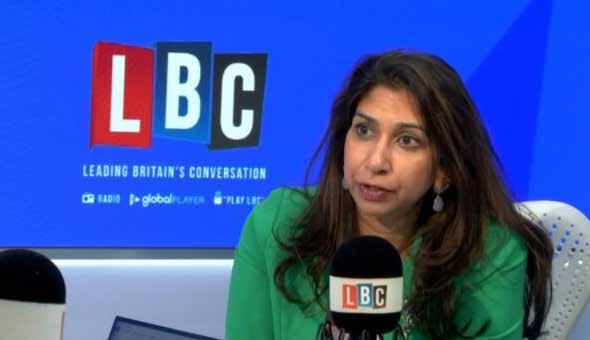
by Hamas with a big pinch of salt,” she noted.
Pressed by Ferrari, Braverman added: “What Hamas wants to believe is that figure doesn’t include any terrorists and that is simply ridiculous. There are academics and statisticians who have debunked that figure in open source reports, distorted and inflated those figures are. I would also say that the Israeli figures put out are approximately
12,000 to 13,000 Hamas terrorists who have been killed. I would take that more seriously as a figure and I would treat anything that Hamas says as propaganda and misinformation.”
Ferrari asked whether UK support for Israel should be ‘unconditional’ following Lord Cameron’s recent comments after the tragic aid convoy incident last week.
Continued on page 4


Continued from page 2
Braverman responded: “Israel is an ally, they’re one of the few democracies in the Middle East and they have been under fierce attack, not just since 10/7 but for many years. They are not just fighting Hamas they are fighting Hezbollah in the north, and they’re fighting the Iranian regime, and Shia militias in the region. They’re on the front line of a broader war that actually directly affects us in the UK.”
Braverman fiercely rebutted accusations IDF actions had been illegal.
She said: “I met with senior military and political figures, and raised the issues you are raising with me directly with senior ministers, with soldiers, those in command and control positions. I’ve probed and I’ve tested, I’ve been very near to the border with Gaza, and I am convinced, and I say this as a former attorney general who dealt with matters of international law and military action, that I very strongly rebut suggestions that Israel is in breach of international law, that there’s a genocide, that there’s a forced starvation. Quite the contrary, Israel is doing a huge amount, using technology, sophisticated methods and a lot of care, to minimise civilian casualties, to get aid into Gaza, and to comply with international law.”
Braverman said the deaths of British aid workers John Chapman, James Henderson and James Kirby last week were a “tragedy” and offered her condolences. Braverman praised Israel’s response. “They were brave people, putting their lives in danger in the aid of
humanitarianism,” she told Ferrari. “They should not have been killed, it was a mistake and the Israelis have been very quick to accept responsibility, to investigate fully, and to apologise. They were incredibly regretful about it. Just contrast with Hamas who celebrate and glorify the killing of innocent civilians.”
Braverman added:
“This was a tragic mistake, it should not have happened. We have already seen the Israeli government come out, dismiss and reprimand those soldiers who are responsible. The reports which have already come out demonstrate that there were errors in communication, procedure, sign off, I’m not going to get into the detail, but there was a catalogue of errors which led to that tragedy. They are going to change their processes to ensure it doesn’t happen again. The reality is that these tragedies happen in war and innocent civilians will sadly die.”
that the government does not need to publish the legal advice as it’s “confidential and privileged”.
She then acknowledged the threat on Britain’s streets from Iranian activities.
Explaining the Iranian Revolutionary Guard Corps was “effectively the military wing” of the Iranian regime, Braverman noted: “They fund and support Islamist extremism in the UK and therefore it really is incumbent now on the government to grow a backbone and take tough action in relation to the IRGC, who I would describe as the chief sponsor of global terrorism.”

Braverman called on Prime Minister Rishi Sunak’s government to proscribe the IRGC as an “official terrorist organisation” as it would give authorities “clearer and more robust powers” to make arrests.
Muslim Brotherhood and Islamic Jihad.
“Their intent in the Middle East is to destroy Israel, to take over the Middle East, to fund and support Islamist extremism and terrorism in the UK,” Braverman observed.
“There is evidence they have been funding Islamist extremist groups in the UK,” Braverman added. “That is reprehensible, it’s damaging our cohesion in society, that’s damaging and harming our public safety, that’s producing some of the horrendous scenes on British streets week in and week out.”
Noting UK authorities have thwarted plots inspired and motivated by IRGC in the UK, she continued: “I don’t think we should gamble with public safety and national security. We need to take the steps necessary to minimise and degrade the IRGC’s capabilities. Proscription is an important tool we can use… The US has taken action to proscribe the IRGC, the Labour Party is calling for proscription of IRGC, the government is behind the curve. They should move forward quickly and take robust action to minimise this very serious threat that we are facing.”
Asked if the UK should sell arms to Israel, Braverman said: “I don’t think the fact these tragedies happen is a reason to walk away from Israel and stop selling arms to Israel because of that broader battle that they are engaging with.”
Braverman supports the convention
“I have been calling for it for some time,” she said. “It is something that I will call for continually going forward and it’s something really the government must do if we are properly to deal with and minimise the enormous threat of Iran,” she said.
Braverman added that Iran is developing a nuclear bomb whilst funding Shiah militias such as Hezbollah, Hamas,
The National Jewish Assembly sponsored Braverman’s trip.
NJA Chairman Gary Mond described Braverman as a true friend of Israel and UK Jewish community.
“This visit has enabled her to bear witness to the atrocities of October 7 and convey the UK’s support for Israel’s mission to eradicate Hamas, as well as to bring the hostages home,” he said.





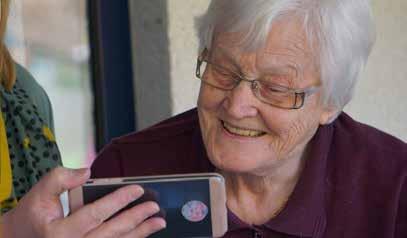
more,
funds can


Global events marked the six month anniversary since the October 7 terror attack by Hamas in Israel last Sunday.
Tens of thousands of people attended rallies in Jerusalem, London, New York, Washington, Toronto, Paris, Amsterdam, Brussels and further afield demanding
to be reminded to call for the release of the innocents. We will not accept the victims being turned into the villains or just into the vanished.”
PM Rishi Sunak vowed to stand by Israel following the “most appalling attack” in its history and “worst loss of Jewish life” since the Second World War.

the return of all hostages held in captivity. The IDF have estimated two dozen hostages are dead.
Demonstrations took place outside the Knesset, UN Headquarters in New York and Trocadeo esplanade in Paris.
In London, hundreds of people packed St Johns Wood Synagogue on Sunday. Dame Maureen Lipman, Colonel Richard Kemp and influencer Oli London joined the packed St Johns Wood Synagogue.
Dame Maureen said: “Somehow we must let these innocent civilians know that their suffering is our suffering. We cannot allow people to forget or to belittle their plight and move on with the rest of the world to tastier sound bites. We need
Continued from front page
“Israeli wounds are still unhealed,” he said. “Families still mourn and hostages are still held by Hamas.” Sunak added: “We continue to stand by Israel’s right to defeat the threat from Hamas terrorists and defend their security.”
Sunak called for an immediate humanitarian pause in fighting leading to a long-term ,sustainable ceasefire.
The Knesset rally was organised by the Hostages and Missing Families Forum. Huge crowds carried photos of kidnapped hostages.
Actor Lior Ashkenazi, spoke about the Forum’s political neutrality, stating: “Anger and pain take on many opinions. The hostages have no party, they don’t do polls.”
There was support for Prime Minister Benjamin Netanyahu but anti-government protesters jeered whenever Netanyahu’s name was mentioned. They also heckled Jerusalem Mayor Moshe Lion during his speech. “Deal now!” they shouted.
Yehuda Cohen, father of Nimrod Cohen, abducted by terrorists from Nahal Oz, said: “We are facing a criminal government that isn’t doing anything for the return of our loved ones.”
And Hagit Chen, father of Itay Chen, accused the government of abandonment, noting, “How is it possible that after six
Meantime, Israel’s staunchest allies have not bowed to pressure to suspend arms sales after last week’s tragic airstrike killed World Central Kitchen aid workers. Israel quickly acknowledged its mistakes and made clear cutting arms would be a dangerous signal to Hamas, Hezbollah and Iran.

“Israel remains a vital defence and security partner to the UK,” Foreign Secretary David Cameron said this week. “Our cooperation makes the UK and Israel more secure from external threats.”
Biden, in an interview broadcast by Univision on Tuesday, called for a six-toeight week ceasefire and access to food and medicine in Gaza but also reiterated support for Israel.
The interview with
months they haven’t brought you back?”
Female family members of hostages stood silently onstage with strips of tape numbered 184, the number of days since 10/7. Bereaved relatives ripped the tape off their mouths before screaming to the audience who screamed back.
Itay Regev, freed last November, addressed the government. He said: “We have returned incomplete… On behalf of our brothers and sisters, I want to ask our leaders, is this true? Have you given up on them?”
Itay’s sister Maya, also a hostage, offered a prayer for hostages to be home for Pesach with families. “From slavery to freedom,” she said.
Ofir Levy Bibas, sister of Yarden Bibas, held captive with his wife and young sons, said: “Kfir [our other son] is supposed to be at his family’s Seder. He is supposed to stay up late for this special night. Sing the four questions and make his family proud. Take a little sip from the win. Will that become a reality.”
Idit Ohel, mother of hostage Alon Ohel, appealed to everyone celebrating Pesach around the world to set an empty chair in honour of the hostages and those killed.
There were no government ministers at the rally. In New York, Ruby Chen, father of Itay Chen, murdered in captivity, said: “My hourglass is empty, but there are 133 left behind. Let our people go.”
Congressman Brandon Williams told the crowd: “We must never forget it was Hamas that ended the cease-fire on October 7. I call on Qatar to end this hostage crisis today.”
Shira Matalon, niece of hostages Eli and Yossi Sharabi who was killed in captivity, said: “There is no price tag on human life. This is how we are different from our enemies, we value human life.”
Shany Granot Lubaton, US Forum chapter co-head said 150 organisations and synagogues participated at the UN rally.
“This is by far the broadest coalition of Jewish community we’ve had, and it shows how sacred this cause is for all of us,” she said.
Former Israeli Prime Minister Naftali Bennett, observed: “Nobody can preach to us about proportionality when there’s
Biden took place two days after the aid convoy tragedy.
While hostage talks continue to be problematic Gallant said the withdrawal of troops was carried out because Hamas “ceased to exist as a military framework” in the city.
“The achievements made by the IDF’s Division 98 and its units, are extremely impressive,” he observed. “We (will see) such missions in the Rafah area. We will reach a point when Hamas no longer controls the Gaza strip and does not function as a military framework that poses a threat to the citizens of the State of Israel.”
As Pesach approaches a Rafah incursion is set to draw global criticism. Netanyahu’s popularity may be diminishing domestically but he has his sights fixed on further dismantling Hamas’ threat.
one man or woman in tunnels of Gaza. The whole world needs to apply pressure not on Israel but on Hamas, on Qatar.”
NYC Congressman Dan Goldman added: “It is truly unconscionable and unimaginable that we could be sitting here six months later with US citizens still in captivity. Is it only because they’re Jewish? This is not only an attack on Israel but on the Western world and our democratic way of life. This conflict is not only Hamas vs Israel but tyranny vs democracy and evil vs good. Hamas must lay down its arms. The only way there will be a cease-fire is if hostages are released.”
Goldman called on the Biden administration and Congress colleagues to put pressure on Hamas.
Two hundred families of Israelis murdered by Hamas called on the government for financial aid.
Speaking at Re’im forest where the Nova music festival was held, Erez Tzarfati, father of Ron, said: “We are collapsing. No one is taking care of our needs.”
Yoram Yehudai, father of Ron, murdered at the rave, added: “Our obligation is to remember and remind everyone who those children, parents, relatives, grandchildren, spouses and friends were. For many families, commemorating those we’ve lost is the reason we get up in the morning. We demand an increase in the commemoration budget for all the families so that we can honour our loved ones properly.”
Yehudai also called on the government to build a ‘second Yad Vashem’ dedicated to 10/7 and the memory of murdered Israelis.
Spanish media has reported Prime Minister Pedro Sanchez plans to formally recognise a Palestinian state by July.
Speaking to journalists during a trip to Jordan, Saudi Arabia and Qatar, Sánchez stated his intention to persuade Arab nations who have not yet recognised Israel to back him. Spain is seeking support from EU countries, including Slovenia and Ireland, and hopes to build a coalition.
Last month Spain, Slovenia, Ireland and Malta issued a joint declaration to recognise a Palestinian state under ‘appropriate’ circumstances. Reports suggest Spain anticipates European support between a Gaza truce and US elections.
Should Donald Trump win the diplomatic landscape could change according to reports.
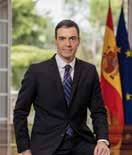

Laugh Your Way













MORNING, AFTERNOON, EVENING DELIVERY SLOTS AVAILABLE

Over 1,000 people marked six months since the massacres of October 7 and capture of over 130 hostages still held in captivity in Gaza at Whitehall on Tuesday evening.
Family members of hostages, the father of a British man murdered on 10/7, an MDA first responder and rabbis addressed the vigil.
Ayala Harel, niece of hostage Michel Nisenbaum, spoke of how her family hid in a shelter as massacres were perpetrated on Kibbutz Be’eri.
Michel was abducted attempting to save the life of his granddaughter.
Ayala said: “We must raise our voices together to demand the return of Michel and all of the hostages. We must keep reaching out to our leaders, demanding they do everything in their power to secure their release. We cannot rest until all the hostages are safely reunited with their families. Together, let us stand in solidarity unwavering and bring Michel and everyone home.”
Steve Brisley, whose brother-in-law Eli Sharabi is a hostage in Gaza, told the crowd: “Close your eyes and think about a family man, a father, a hard-working provider, a football fan. Can you picture him? Can you see him? He’s my brotherin-law, but he’s also your brother, your father, your husband, your friend. He’s also you. He is all of us. Thank you for
seeing him.”
Michael Marlowe, father of British citizen Jake Marlowe murdered at the Nova music festival thanked everyone for attending and showing support for the hostages.
Magen David Adom first responder
Ophir Tor said: “We are colour and religion blind. We help everyone. Twenty seven of us are dead and there is no outside voice saying that it’s wrong.”
Chief Rabbi Sir Ephraim Mirvis said: “At
so many Seder tables there will be empty chairs this year. Empty chairs for a child or grandchild or parents or grandparents or spouses. From here we declare our promise to the hostages and to their families. We will not be silent until every single one of them comes back home.”
Rabbi Joseph Dwek, S&P Sephardi Community, added: “The hostages are our brothers and sisters. Not a day can go by when we do not pray for them, feel for them and speak out for them, stand
strongly for them, yearn for their return and pray for their return and that is what we do here, this evening.”
The names of remaining hostages were read out at the event organised by the Board of Deputies, Jewish Leadership Council, Hostages and Missing Families Forum, UJIA, MDA UK and the Embassy of Israel.


Israel Defence Forces have made “considerable” achievements since the October 7 terror attack by Hamas but the price has been “painful and high” Prime Minister Benjamin Netanyahu told ministers at his weekly cabinet meeting on Sunday.
The declaration came in the sixth month since the terror group murdered over 1,200 people and abducted over 250 hostages.
At least 34 of the 130 hostages still in Gaza are dead according to the IDF. There is still no sign of a breakthrough in negotiations in Cairo for a ceasefire-hostage deal.
Netanyahu, who is under ever-growing pressure domestically and internationally, said that 19 of Hamas’s 24 battalions,
including senior commanders, had been eliminated. The IDF had killed, wounded or captured many Hamas terrorists. Command centres had been cleared whilst the Gaza operation had destroyed rocket factories and stores of weapons and ammunition.
“We are continuing to systematically destroy underground installations,” explained Netanyahu. “However, the price that we have had to pay has been painful and high. We will never forget the horrific crimes of the Hamas monsters. We have returned 124 hostages and we are committed to returning them all home.”
He added: “I have made it clear to the international community there will be no ceasefire without the return of the hostages. It simply will not happen. This is the policy of the Government of Israel and I welcome the fact that the Biden administration made it clear on Friday that this still is its position as well.”
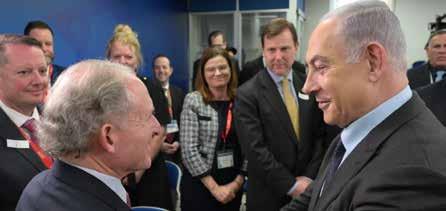
Netanyahu condemned Hamas for preventing a
hostage deal.
“Its extreme demands are designed to bring about a ceasefire and leave it intact, to ensure its survival, existence and ability to endanger our citizens and soldiers,” he said. “Capitulation to Hamas’s demands would allow it to try and repeat the crimes of October 7 again and again. Hamas hopes that external and internal pressure will cause Israel to capitulate to these extreme demands. That will not happen. Israel is prepared for a deal, Israel is not prepared to surrender. The pressure of the international community needs to be directed at Hamas. This will advance the release of the hostages.”
Addressing Israeli citizens, he said: “There is no war more just than this one, we are determined to achieve total victory, to return all of our hostages, to complete the elimination of Hamas in the entire Gaza Strip including Rafah and to ensure that Gaza never again constitutes a threat to Israel.”
Netanyahu added: “This war has shown the world what Israel has always known. Since October 7, we have been attacked by Iran’s proxies, Hamas, Hezbollah, the Houthis, and militias in Iraq and Syria. Whoever harms us or plans to harm us we will harm them. We are carrying out this idea in practice, all the time. Countries rise amidst unity and fall amidst rifts. Let our enemies not be mistaken, the decisive majority of the people is united on the need to continue fighting
until victory. We will stand united. We will strike our enemies. We will eliminate Hamas.”
President Isaac Herzog said the State of Israel embraced hostage families. He noted: “The most fundamental covenant between a state and its citizens obliges us to act in every way to bring them home. The IDF and our security forces have been operating with all their might to bring back the hostages and to fight terrorism.” He added: “Israeli citizens in the north and south have not yet returned to their homes. It is imperative not to forget that this is a supreme national priority. Despite the pain and turmoil, I am full of hope. I have seen so many Israelis doing everything for the better of us all. I feel anew immense pride in being part of this people.”
IDF Chief of Staff Herzl Halevi said the army was working to return the hostages but negotiations must be conducted “responsibly and with discretion”.
Halevi added: “When we set out to war we knew it would take a long time to achieve the objectives. Those objectives have not yet been achieved in full, returning the hostages, returning the northern and southern residents of Israel, and dismantling Hamas in Gaza, in a way that will enable the ruling of an alternative government in Gaza. Returning the hostages is the most urgent and their hourglass is different from that of the other objectives.”

The Association of Jewish Refugees has led tributes to Kindertransport refugee and trailblazing journalist Hella Pick following her death last week (April 4).
The Guardian’s renowned former foreign correspondent and diplomatic editor, who died aged 96, over nearly three decades reported on global stories including the assassination of President Kennedy, Martin Luther King’s march from Selma to Montgomery, the Vietnam peace negotiation in Paris, 1968 student revolt in France, solidarity movement in Poland and Cold War.
Among many notable stories, an interview with Willy Brandt led to a friendship that enabled her to come to terms with Germany’s Nazi past.
Michael Newman, AJR CEO, described Hella as indefatigable and a pioneering journalist of great repute.
“We feel fortunate to have worked with her on a number of occasions, including most recently to mark the 85th anniversary of the Kindertransport,” he said. “Hella was one of the Kinder who met His Majesty the King at our commemoration last November and participated at events in both Vienna and the UK. She was dedicated to raising awareness of the Holocaust and sharing her story. We feel privileged to have captured her testimony as part of our Refugee Voices archive.”
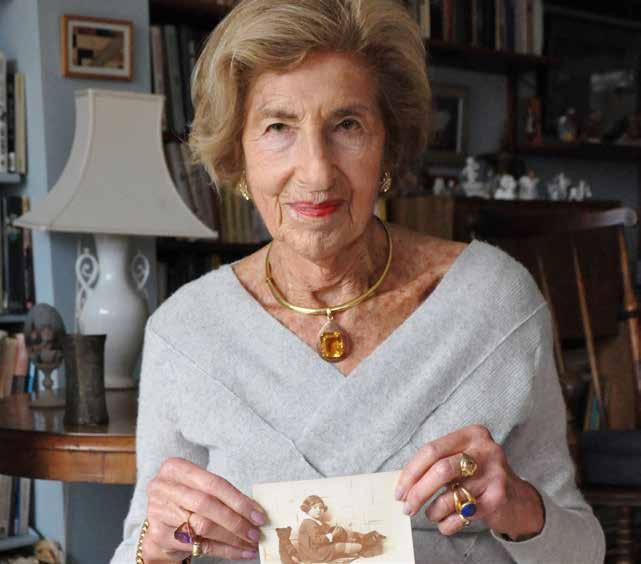
life. That she was still working up until a few weeks ago is a testament to her dedication and grit.”
Born in Vienna, April 1929, after the Nazis annexed Austria, Hella’s mother put her 11-year-old daughter on a Kindertransport train, arriving in Liverpool Street. She lived with a Jewish family in London, the Infields, who had three children, and wanted to adopt her.
When Hella’s mother received a domestic visa, she joined her in the Lake District, spending August 1939 with the Chorley family. Theo Chorley was a professor at London School of Economics. Educated at a private school, arranged by the Chorleys, Hella graduated at the LSE. Her first journalism job was with London-based magazine, West Africa, in 1958. Three years later, Hella began freelancing for the Guardian. Appointed a UN correspondent in 1962 she left as diplomatic editor in the mid-1990s.
Guardian Editor-in-chief Katharine Viner said: “Hella was an incredible force and an inspiration. She had unrivalled contacts and immense knowledge about world affairs and was always steely in her determination to find out the facts. When she started out, there were very few women foreign correspondents, but she soon won the admiration and respect of colleagues both within the Guardian and in the wider world. Her personal history as a refugee from the Nazis shaped her
Paul Webster, Observer editor and a former Guardian foreign editor, recalled: “Hella was unique, a formidable journalist with an extraordinary grasp of the complexities of Cold War Europe and a contacts book to match. She knew senior figures from the chancelleries of capitals on both sides of the iron curtain, and used her imperious presence and huge charm to great effect to provide the Guardian with fine coverage of those fraught days. She was both grand and generous in equal measure, and a much-admired part of the Guardian’s coverage during the final tumultuous days of the Cold War.”
Alan Rusbridger, Prospect magazine editor and a former Guardian editor-in-chief, added: “Hella was at the heart of virtually every major diplomatic event since the early 1960s. She was utterly formidable in her determination to get the story. Her range of contacts was extraordinary and her knowledge encyclopaedic. Well into her 90s she was writing elegant long-form pieces for Prospect magazine, including an article drawing sobering parallels between the war she fled as a Kindertransport child in 1939 and the rise of Putin. She was one of a kind.”
Emma Graham-Harrison, Guardian senior international affairs correspondent, interviewed Hella in 2021.
She said: “Her intelligence and determination allowed her to carve a career in a world that was deeply hostile to women
journalists, particularly foreign correspondents, and made so much possible for those of us following in her footsteps. She was probably the oldest working journalist in the UK, and was deeply engaged with the world, even as she was leaving it. The days before her death, weak and in hospital, she still wanted to talk about her horror at the situation in Gaza and her fear for Ukraine’s future, with Europe and America distracted and divided. Always interested in people, she was open to making new friends all through her life, even into her 90s.”
Hella also wrote for the New Statesman. Arts & Culture Programme Director at think-tank Institute for Strategic Dialogue, Hella had British and Austrian citizenship.
Honoured with a CBE in 2000 for work as a journalist and writer, in Germany Hella was known for a TV appearance on Internationales Frühschoppen and Presseclub.
Hella’s memoir, Invisible Walls, published 2021, documents her remarkable life.


Prime Minister Benjamin Netanyahu has met with a Republican US Congressional delegation organised by AIPAC.
During the meeting, which included AIPAC senior leadership, Netanyahu briefed the delegation on fighting in the Gaza Strip and answered the Representatives’ questions on defeating Hamas, efforts to free the hostages and humanitarian aid.
“There’s a long tradition of the American-Israeli alliance,” he said. “It’s always been necessary, but it’s more necessary now in the face of the barbarism that we face, that threatens our entire civilisation.
“This is a battle between not only Israel and Hamas, but I would say the axis of Iran, the terror axis of Iran that seeks to put the Middle East back into the Dark Ages and to force a terrible barbarism on us all, really, the Dark Ages, and its proxies, the Houthis, Hamas, Hezbollah and others, and Israel, the moderate Arab states and of course backed by the United States.
“That’s what this conflict is about. Everything that you’re hearing in recent years, in recent months, in recent days and in recent hours emphasizes this basic truth. This is a larger battle. Our battle is your battle. Our victory is your victory. And if we don’t have a victory, this will
have enormous implications for American security, for our common future. We must win.”
He added: “Victory is within reach. It’s very close, and there is no substitute for victory. But it can be made quicker.
Winston Churchill once said, ‘Give us the tools and we’ll do the job.’ Give us the tools faster and we’ll finish the job faster.”
Netanyahu expressed his opposition to a Palestinian state as it would be “another terror haven” as was Hamas in Gaza.
“That is opposed by Israelis, overwhelmingly,” he said. “We just had a vote in the Knesset: 99 to 9. The people of Israel choose life, and life means security and security means defeating our enemies, but also standing together for our common civilisation.”
President Isaac Herzog met a delegation from the Democratic Party also led by AIPAC.
Herzog welcomed the trip to Israel in “dire days and difficult moments”. He told the group: “It means a lot to the Israeli people. The US has no greater friend than Israel, and Israel has no greater friend. This unbreakable bond, this alliance, is as strong as ever and is irreplaceable.”
Herzog said Israel and the US shared the objectives of
eradicating terror and fighting Iran.
“We are here fighting on behalf of humanity and for the entire free world,” he said.
Regarding Hamas, he noted: “We are fighting a violent, aggressive and brutal terrorist organisation which holds 134 Israeli hostages. We are praying, acting and calling for their release every day.”
Herzog added: “We share with the US and President Joe Biden the same vision of eradicating terror, of bringing the hostages back home, a vision of moving towards peace with our neighbours, once we finish the ability of our enemies to carry out terror from Gaza against us.
“Finally, most importantly, we share the vision of inclusion of Israel in the region. I believe strongly, including the normalisation with Saudi Arabia.”
Praising Biden as a “great friend of Israel”, Herzog vowed to strengthen the bond between the two nations.
“This bond is unique throughout the history of two nations who believe in true humanitarian values,” he said. “We will work together to alleviate and upgrade humanitarian aid to Gaza, bring the hostages home, fight terror, stand up to the empire of evil and lead the world and region to a better future.”
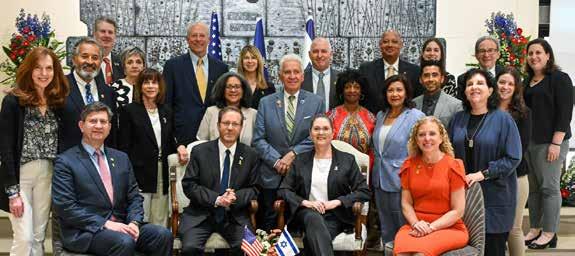
President Isaac Herzog met with Rwanda President Paul Kagame to mark the 30th anniversary of the genocide against the Tutsi people.
Herzog participated in a wreath-laying ceremony at a central monument and attended the state ceremony marking the genocide alongside international leaders, presidents, prime ministers, foreign ministers and heads of international organisations.
After presenting Kagame with a necklace calling for the release of hostages held by Hamas in Gaza, he told him: “We all pray and want them back as soon as possible. It says ‘my heart is in Gaza’.”
Herzog is the first Israeli leader to visit Africa since the October 7 terror attack. The visit took place during ongoing international efforts to secure the release of the hostages held by Hamas.
Herzog discussed the hostage crisis and struggle against global terror with former US President Bill Clinton whilst on the diplomatic trip.
During the ceremony, President of the European Council, Charles Michel condemned the attack by Hamas and called for the immediate release of the hostages held by terrorists in Gaza.
Herzog went on to hold diplomatic meetings with leaders from around the world, reiterating the need to secure the release of hostages held by Hamas for six months including women, children, and the elderly.
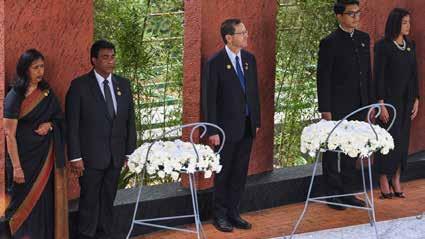
Herzog commented, “Leaders from around the world honoured victims of the genocide of the Tutsi people in Rwanda.
Three decades after these atrocities the world must look squarely at the crimes and recognise the true horrors of genocide, the deliberate attempt to annihilate a people.
“The world must not allow the politicisation of genocide, it must not allow the belittling of the horror of such crimes, and the degrading of the memory of the victims of genocide.”
He added: “The Jewish people know all too well what it means to be threatened with annihilation, to be the victims of genocide, terror and hatred. Even today, as we are erroneously and falsely accused with modern blood libels, we remain the target of a vicious and evil regime in Tehran, with its proxies across the region, whose stated aim is the destruction of the Jewish nation. We must all stand together in the promise, Never Again.”
chapter of history, the victims, survivors and descendants,” noted a statement. “We honour the lives lost and enduring strength of those who survived.”
WJC added: “In a world plagued by
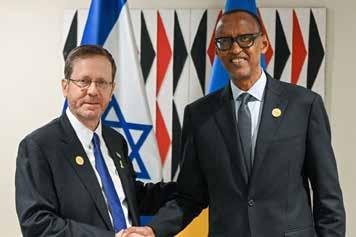
World Jewish Congress commemorated the 30th anniversary.
WJC, on behalf of over 100 affiliated Jewish communities around the world extended its solidarity. “Our thoughts are with all those affected by this tragic
the denial and trivialisation of genocide, the international community must unite to preserve the memory of these dark events. WJC unambiguously stands against hatred and bigotry in all its forms as it pursues a future of coexistence and respect. In standing united with the people of Rwanda, the WJC strives to ensure that ‘Never Again’ does not remain an empty promise.”











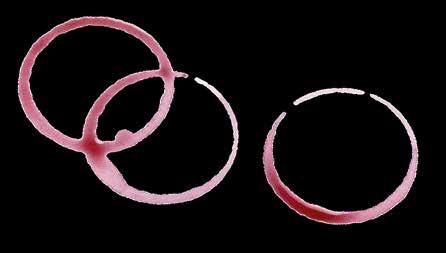
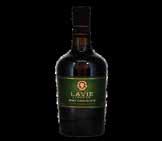
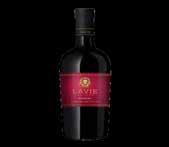




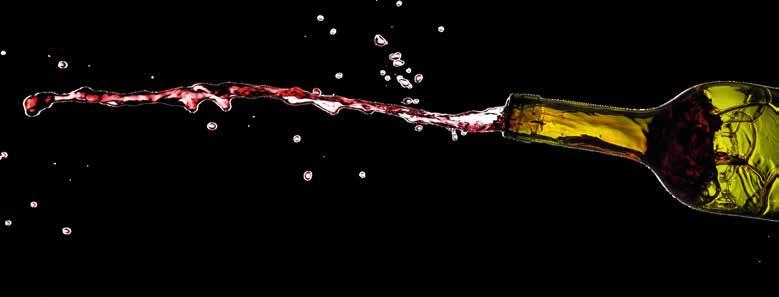





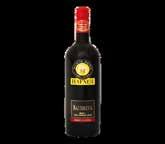











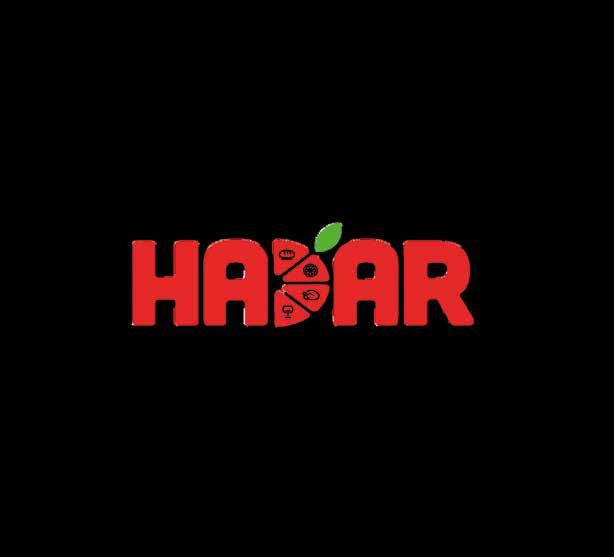







RAKUSEN'S MATZOS WAS £2.69 NOW £1.99 WAS £6.49 NOW £4.99
LARGE 30 EGGS TRAY

DUTCH GOUDA LARGE 380G WAS £10.99 NOW £8.99

GEFEN PLAIN/LITE MAYO PASSOVER NOW £6.99 WAS £9.39



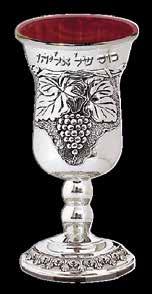
WAS £2.65
DOZEN EGGS NOW £1.99










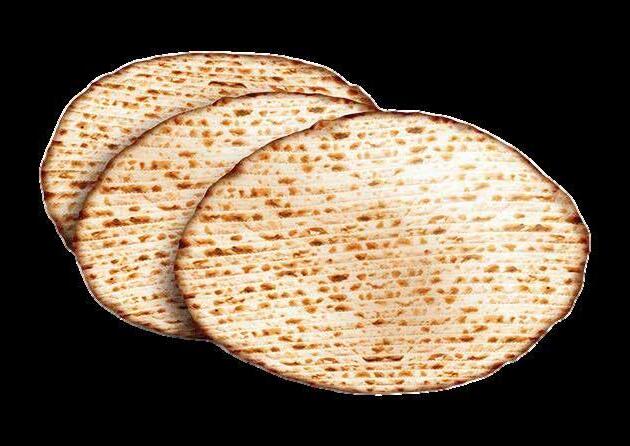

SMOKED SALMON 100G / 200G WAS £3.99 / £7.99 NOW £2.99 / £5.99

TAAMAN TUNA IN WATER
WAS £1.49


NOW £3.99
NOW 5 For £5.50
SWISS BAKING CHOCOLATE WAS £6.69 / £5.49
GENEVA / ALPROSE CHOCOLATE BARS
WAS £2.99
NOW 2 For £4
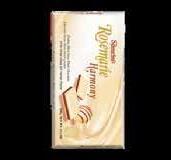
SUNFLOWER OIL WAS £1.99
NOW £1.49




PRIGAT JUICE 1.5 L
NOW 2 + 1 Free


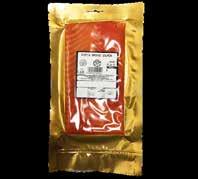




SCHMERLING CHOCOLATE BARS WAS £3.49
NOW 2 + 1 Free
TT TUNA LIGHT IN WATER WAS £1.29
NOW 5 For £5
MAKABI FRUIT YOGURT LARGE 6'S WAS £6.29
NOW £4.99

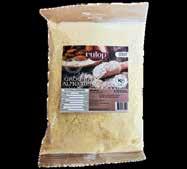
GROUND ALMONDS 200G WAS £3.49
DIET & ZERO COLA / SPRITE 1.5L
WAS £3.39
NOW £2.69
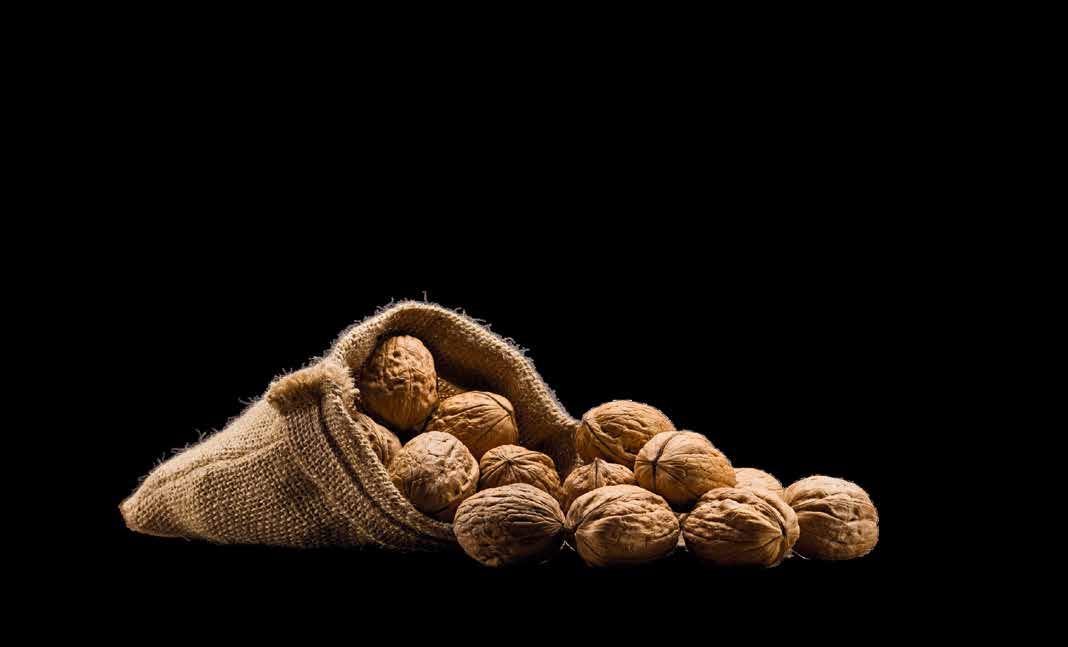
NOW £1.99
CHEVINGTON CHEESE BLOCKS 360G / 180G
WAS £5.39 / £2.69

NOW £3.99 / £1.99

WAS £3.99

COCA COLA / SPRITE / FANTA EXOTIC 1.5L
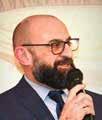 OPINION PIECE
BY STEVE WINSTON
OPINION PIECE
BY STEVE WINSTON
Six months have passed since the horrific Hamas invasion of Israel, a day that seared its mark into the annals of our collective memory with unparalleled brutality. As the world moves on, embroiled in its ever-turning cycle of news and narratives, a critical issue remains glaringly unresolved—the fate of the Israeli hostages still held captive by Hamas in Gaza. Amidst the global discourse, there’s an alarming tendency to obfuscate and distract from this most urgent matter. However, the 7/10 Human Chain Project’s event on the weekend, in partnership with the National Jewish Assembly (NJA), pierced through this veil of forgetfulness with a powerful reminder of the human toll at the heart of this conflict.
The NJA’s partnership with the 7/10 Human Chain Project for the event, under the meticulous guidance of Events Manager Dalia Hajioff, was not just a mere gathering; it was a resonant demand for action. It sought to remind the world of the ongoing agony faced by the hostages and their families—a torment that has only intensified as days have turned into months. The participation of figures such as Colonel Richard Kemp, Dame Maureen Lipman, and influencer Oli London lent voices of reason and compassion to a cause that transcends political divides, shining a light on the undeniable human suffering that continues unabated.
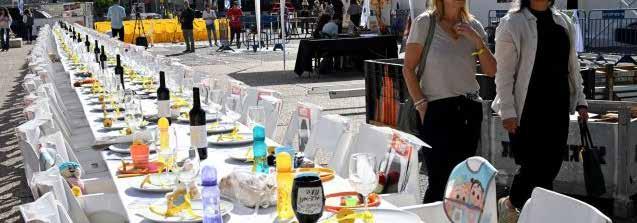
This sombre anniversary serves as a critical juncture, prompting us to question the efficacy of mere words against the backdrop of such profound human suffering. The clarion call is clear—the Israel Defense Forces (IDF) must undertake a decisive operation into Rafah, not only to rescue the hostages but to dismantle the very infrastructure of terror that Hamas has entrenched. Such an action is paramount not only to Israel’s security but to the upholding of our most basic human values.
The tacit or overt support extended to Hamas by some, under the guise of political activism or resistance, stands as a stark betrayal of these values. The justification of such heinous acts of terror, the whitewashing of atrocities committed, strikes at the very foundation of our morality. The time for reckoning is now, to unequivocally
reject the legitimacy falsely attributed to a terrorist organisation responsible for unspeakable acts of violence and oppression.
As we commemorate this tragic milestone, let it not be an occasion for despair but a rallying point for decisive action. This moment must galvanise us, individually and collectively, to recommit to the principles of justice, peace, and our Jewish bonds. The narrative of right over might, of human dignity over barbarity, must prevail. The time for discussion has ended—the moment for action has unequivocally arrived.
The IDF’s mission into Rafah to rescue the hostages and eradicate the threat posed by Hamas is not just a strategic necessity; it is a moral obligation, a clarion call to defend the sanctity of life and liberty against the dark forces of terror and tyranny.
In this critical hour, the NJA, alongside
 BY ROBERT FESTENSTEIN
BY ROBERT FESTENSTEIN
I was in Shul on a Shabbat morning and someone who had been recently bereaved was saying kaddish. I didn’t know them so didn’t know if it was for a spouse or some other family member, just that they were saying kaddish.
I know from experience that if you are not used to saying kaddish, it can be tricky. Unfamiliar text, out loud, a lot of people listening to you and of course, feeling sad. So when this man – I will call him Chaim, since describing him as just this man seems a little impersonal. So when Chaim started it was clear he was going to still be speaking when everyone else had finished and the risk under these circumstances is that the service would continue whilst he was still speaking. And that is what happened, only it
didn’t. Those around him made sure that those taking the service waited for Chaim to finish. Twice they called out to give Chaim the time he needed and twice everyone waited, quietly and respectfully. No muttering, no grumbling, just an understanding that this person needed to finish what he had started on the road to dealing with his loss.
It is this understanding and unity of purpose that has emerged over and over again these past 6 months, since the horrific events of the 7th October. The desire to see the return of the hostages is a common thread that is drawing us all closer together. Pesach, once all the preparations have been done is always a time for reflection. Of the escape from the land of Egypt, the blood libels, the creation of the State of Israel and above all a personal connection with the escape from Egypt together with the obligation to remember it and to talk about it.
Which is what we are doing now with
the missing hostages. Thinking about them, raising their profile and wishing them to come home now.
When it comes to telling the story of Pesach, the mitzvah is that we should speak of the Exodus as if we had been saved and further, we are reminded that in every generation our enemies have tried to destroy us. These themes translate into two principles, firstly that our virtual involvement in the Exodus should make us forever vigilant and so never forget the lessons of history. It is only by speaking as if we had escaped from the land of Egypt that we are able to put into a contemporary context the evil intentions of our enemies.
In this country and indeed all countries in the diaspora we are dependent on the authorities to protect us. Sadly, for reasons passing understanding those authorities are not acting to help us, so that the protection which is available under the law is not being implemented and so
the 7/10 Human Chain Project and the global community of conscience, stands resolute. Our collective voice, demanding the safe return of the hostages and the destruction of Hamas, must echo through the corridors of power and resonate across the globe. This is our duty, our burden, and our pledge: to ensure that justice is served, that humanity prevails, and that never again will such a tragedy be allowed to unfold unchallenged. The path forward is fraught with challenges, but the resolve of the righteous is unwavering. Together, we must and will secure a future where peace reigns supreme, and the spectre of Islamic terror is banished to the annals of history, a relic of a bygone era
Steve Winston is the Managing Director of the National Jewish Assembly
that lack of action is allowing our enemies to attack us. It is no different in real terms from a direct attack.
Yet we have shown we are able to fight back. When lawyers wrote to Rishi Sunak last week calling for him to stop providing arms to Israel, I was proud to sign a letter in response pointing out the errors with the original letter and making it clear that the initial letter which had shown ‘serious ignorance’ of ‘relevant International law’ and judgements made by the International Court of Justice.
In the run up to Pesach, and with all that is going on in Israel and here, we should remember that there is more that unites us than divides us. When Chaim takes his time to say his kaddish, waiting for him to finish is just another way of recognising that we have a common purpose, and even now when our enemies are trying to destroy us we will prevail.


This Pesach, we will inevitably reflect on the world as it stands today. October 7th, now over six months ago, is a date deeply engrained in our hearts and minds. On that day, the world changed for so many of us.
But, as Jews, we are guided by values which teach us not to forget others facing conflict and disaster around the world. On the 24th of February 2022, lives changed forever in Ukraine. We’ve now seen more than two years of hurt and pain. Two years of damage and devastation. Two years of fear and uncertainty.
Pre-war, I travelled to Ukraine more times than I can count, visiting our partners and clients as Chief Executive of World Jewish Relief. We have worked inside Ukraine for 30 years, helping people repair their homes, survive despite tiny pensions, live with the impacts of dementia, and earn a living. So, when the fullscale Russian invasion began, I watched in horror as streets I once walked were reduced to rubble.
Since war broke out, I have returned to Ukraine on multiple occasions. Each visit feels more dangerous and more difficult to come to terms with. During my last visit, I met some of the Jewish families we’re supporting amidst the traumas of war. One such family was Olga’s.
Olga, her husband and two children had a good life before the war – a Jewish family of four just like yours or mine… and then everything changed. When the air raid sirens began, Olga only had one focus – to protect her children. With her husband called away to fight, and her children desperately frightened, she was in a constant nervous state.
Olga knew she had to flee and made it safely to Lviv and the active Jewish community there. She made the right choice. Just days after, shelling destroyed the basement shelter they had been living in and the town was flattened. They were lucky, but they didn’t feel lucky. Olga told me how she clutches her children tight, terrified, every time she hears an air raid siren. Her children, Lev and Melissa haven’t been to school in over four years. First due to Covid, and now war. Olga revealed how she can barely cope with seeing her once happy children, now so sad.
Thanks to our supporters, we could be there for Olga and her family, providing Lev and Melissa with much needed counselling and weekend school to help them develop and socialise. The family have been given financial support to help them survive. Olga can already see a change in her children. Lev is communicating more, opening-up a little, and they play outside when they can.
It will inevitably take time for the children’s lives to feel normal again, but we will be there for them and other families – both within and beyond the Jewish community – every step of the way. Olga’s words have stuck with me: “I’m proud to be Jewish and proud of our people who do not leave you in difficult times but reach out a helping hand.”
Being in Ukraine makes me angry, it makes me frightened at times, and I often want to bang my fist on the table and say enough. But that is not going to change anything. We need to do much more. The futures of thousands of families are on a knife-edge, and it can go either way. You, reading this right now, have the power to do something. By giving to our Pesach appeal today, you
can change Jewish families’ futures in Ukraine for the better. Find out how at www.worldjewishrelief.org/pesach.
Paul Anticoni is the Chief Executive of World Jewish Relief

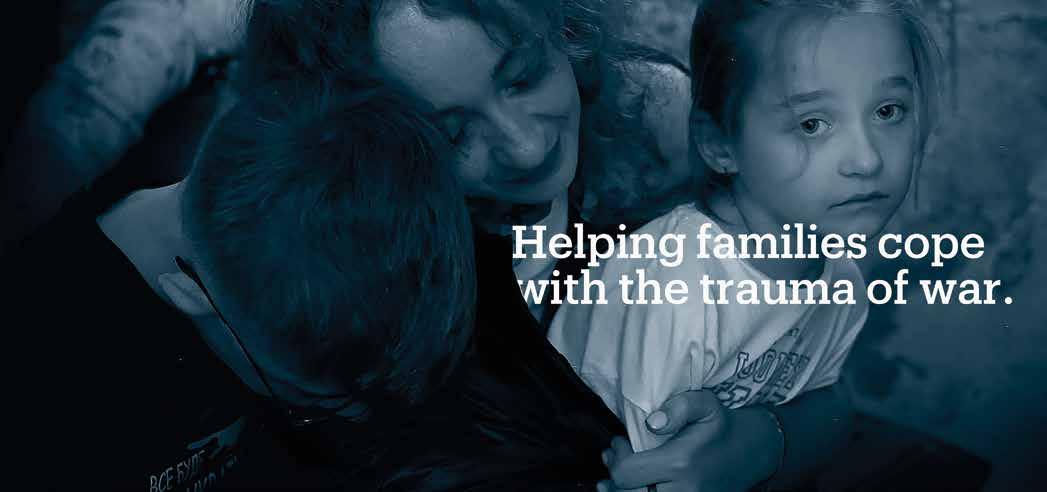
It’s been two years of hurt and pain, two years of damage and devastation, two years of fear and uncertainty. Parents and children are traumatised. The suffering of war never seems to end. But you can help them today.
This Pesach, will you help Ukrainian families suffering from the trauma of war?
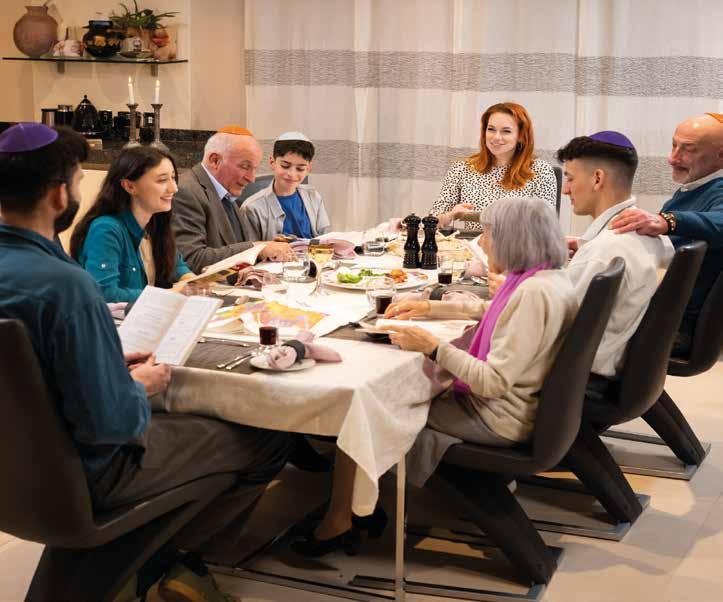
us respond to this unprecedented mental health challenge. As we gather together at Pesach, over a quarter of our community – thousands of Jewish people of all ages – will be struggling with their mental health.* To tackle this immense challenge, Jewish Care and Jami have recently joined forces and become one organisation. Your support will enable us to provide vital mental health services to those in the community who need it most.









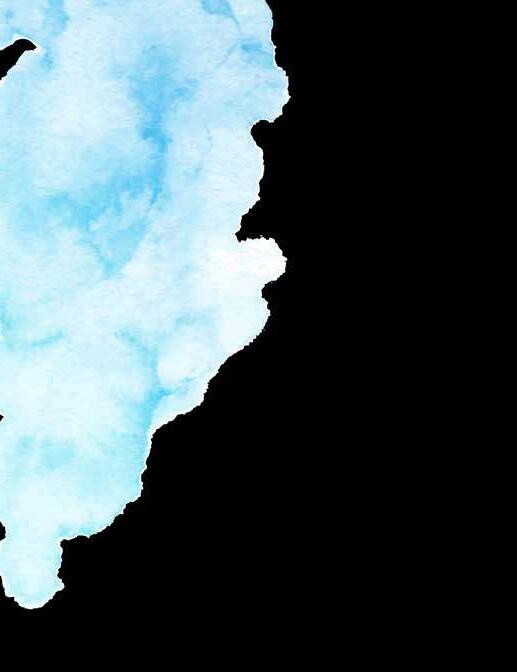
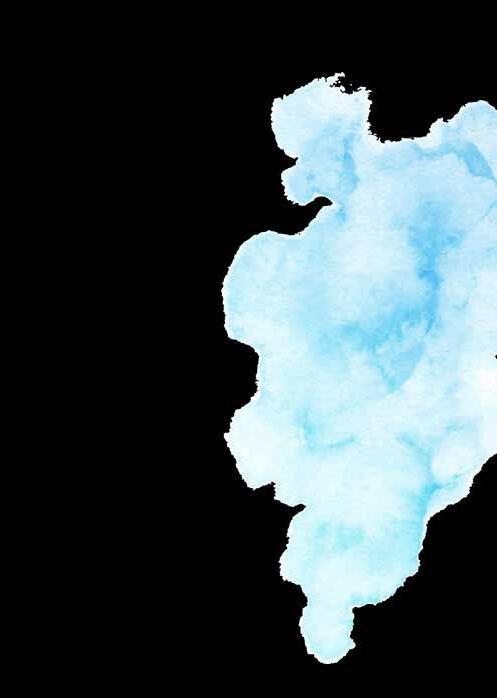
It felt really good that Chai was there for me and all my family all again. For Dad it was counselling, for Mum it was therapeutic massage and for me and my siblings, a combination of talking, music, art and play therapy. Thank you Chai.
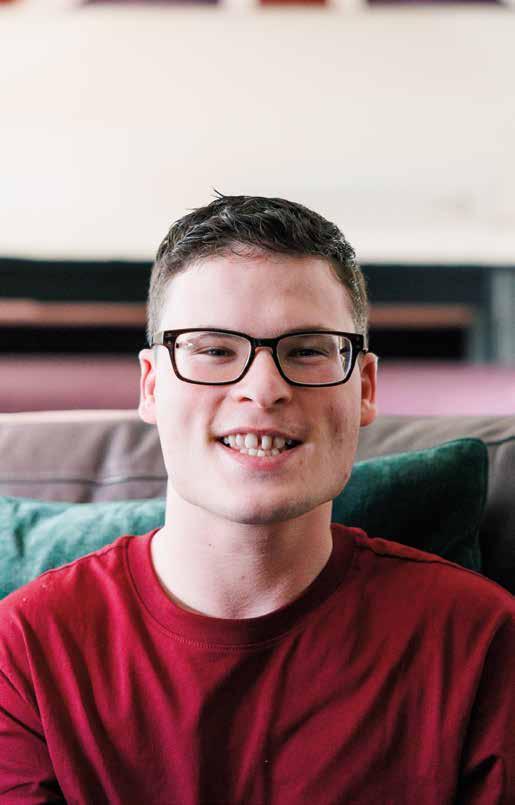

I used to get very frustrated when people didn’t hear me. When I started going to Norwood’s Unity holiday schemes, and mum went to their Rainbow group for parents, things became much calmer.
Now I feel part of the Norwood family, who accept me as I am. The team helped mum step into my world. We’ve learned to enjoy every moment together and I feel understood.



I’m Chase. And I am Norwood.
Chazal say we were redeemed in the merit of nashim tzidkaniyos: Miriam and Yocheved, as well as all the women of Am Yisrael who birthed children, even when they were experiencing slavery and despair. Three millennia later, Israeli women are facing the choice of bringing life into a world overshadowed by a war, and holding their homefront island together, alone.
EFRAT will be there to support a
woman’s decision to welcome new life despite her circumstances, and we will see a soul born for each we have lost.
Years ago, EFRAT identified that Israeli women might see another child as a financial burden she could not possibly take on. This led to EFRAT devising a case management system of moral support, counseling, and financial assistance. The latter, an initial package of crib, stroller, bathtub, infant seat, layette, is followed by monthly deliveries of diapers, wipes, infant formula, and, where necessary,

staple food items for the whole family. This strategy has facilitated the births of over 86,000 Jewish babies in the last 47 years.
EFRAT founder Dr. Eli Schussheim, zt”l, took a leaf from Miriam’s book, speaking up for those without a voice - Israel’s unborn babies. The doctor took his mantra all over the world: Money should never be the reason for ending life!
This passion and his great love for the Jewish people inspired others, as well. One of those was Rabbi Baruj Garzon, Rabbi of Madrid, and the first chief rabbi of Spain since the Spanish Inquisition. In the wake of Dr. Schussheim’s 2008 visit to Madrid, Rav Garzon mobilized Spanish communities nationwide to fundraise for EFRAT.
Rabbi Garzon’s volunteers worked tirelessly to rally Spanish Jews to the cause, translating EFRAT’s promotional material into Spanish and organizing one-on-one fundraising encounters. Rav Garzon looks back fondly; every year, their efforts would
generate a generous sum, which they considered their way of “supporting Israel from within.” Rav Garzon subsequently made aliyah to Ra’anana in 2018, where he now leads a community of Spanish expatriates. He continues to visit Madrid, repeating his own mantra that it is our zechus to support EFRAT’s beneficiaries.
EFRAT’s volunteers are continuing their holy work to prioritize resilience by meeting the needs of any woman who chooses our age-old response of Am Yisrael Chai.
For more information contact us at info@cribefrat.org and visit www.cribefrat.org
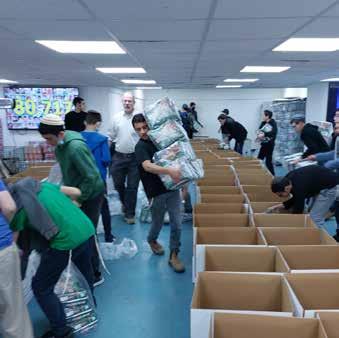
The London School of Jewish Studies is delighted to invite applications for its LSJS Rabbi Sacks Learning Fellowship; an exciting one-year course for engaged and passionate young professionals, who are dedicated to being proactively involved in the Jewish community.
Launched in September 2022, the Fellowship is made up of a select cohort of inquisitive and aspirational young Jews who want to increase their learning and strive to lead a meaningful Jewish life. They will be taught by expert educators from the UK and abroad, including Rabbi Sacks’ closest students.
“We were grappling with how we could begin to enshrine the legacy of Rabbi Sacks as we planned our educational future without our former principal and guiding light,” said Michael Rainsbury, LSJS’ Head of Adult Education.
“We decided to update and reimagine a course Rabbi Sacks devised in 1978 for students, with the aim of introducing the main themes and challenges of Jewish faith, practice, theology and philosophy. Using this as a springboard, we designed a one-year programme that navigates contemporary modern living through an honest engagement with Jewish thought,
teachings and wisdom. We are looking forward to welcoming our third cohort onto the programme.”
“Crucially, the Fellowship does not aim to merely teach the ideas that Rabbi Sacks taught, but instead aims to foster a cadre of individuals who think, learn and speak Torah in a way that reflects Rabbi Sacks’ unique worldview”, said Joanne Greenaway, Chief Executive of LSJS.
The programme brings together a prestigious cohort of young professionals who spend the year exploring key themes in Jewish thought, as well as Rabbi Sacks’ teachings, with an emphasis on their relevance and application, and how they can influence our lives.
One previous participant, Rafi Addlestone, was responsible for spearheading LSJS’ symposium on ‘Climate Change and Halacha: Theory to practice’, held in November, which strived to bring together the worlds of Torah and science. According to Rafi, “the Fellowship was a fantastic deep dive into Rabbi Sacks’ thought and inspired me to pursue an initiative to bring together over 40 orthodox rabbinical leaders and educators, with
the aim of bringing about a change of approach in UK mainstream orthodoxy, whereby climate change is framed within the language of halacha.”
“The Rabbi Sacks Learning Fellowship was a truly formative experience that will stay with me for the rest of my life”, said past student Jon Dannemann. “This is one of the few programmes I am aware of that provides an overview as to how our ancient and venerable tradition grapples
with, and answers some of the world’s most serious and pressing questions. There is probably no other organisation that can deliver this programme aside from LSJS, with which the late Rabbi Sacks had such a close relationship.”
For applications, please contact joel. ucko@lsjs.ac.uk
For more information please go to: www.lsjs.ac.uk , call 020 8203 6427 or email lsjsadmin@lsjs.ac.uk
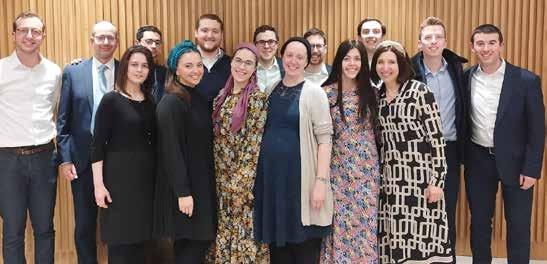


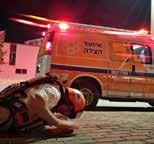
At Kisharon Langdon, we understand the challenges faced by families in the Jewish learning disability and autism community. We need to raise £4 million per year from the community to meet the increasing need for our services including education, supported living, employment and day opportunities.
Thank you for your support this Pesach.
Please donate at kisharonlangdon.org.uk or by scanning the QR code






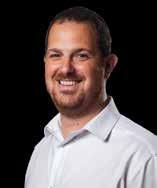



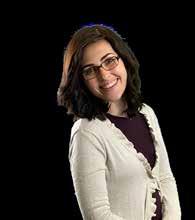
On 28 December 2018, the company Fair Insects BV submitted an application to the European Commission to recognise frozen, dried and powder forms of yellow mealworm larva (Tenebrio Molitor) as a novel food – the first insect ingredient processed for human consumption. This was followed in 2019 by a request of the French company called Nutri’Earth. In June 2021, the insect protein of the mealworm larva was approved by the EU.
Since then, a significant number of applications for approval of insect derived ingredients has been received for safety evaluation by the European Food Safety Authority (EFSA). Most, if not all, have achieved positive recommendations by the EFSA, and this has led to their approval by the European Commission.
Insects have been touted as a potential food source both due to their sustainability, requiring fewer resources than traditional livestock, and to their nutritional value, being rich in protein. Some believe insects have the capacity to supply future global food demands.
From a purely scientific and practical perspective, there are several concerns that have been raised. To mention just three:
Allergens - Some individuals may have allergies to specific insects or their proteins. Examples include tropomyosin in crickets and arginine kinase in mealworms. Possible cross-reactivity with existing allergens in shellfish or dust mites is also a concern, as they may share similarities with some insect proteins.
Nutritional Composition - Whilst insects are rich in protein, they may lack other essential nutrients
such as vitamins, minerals, and fatty acids.
Environmental Impact - Although insect farming is generally considered to be more environmentally sustainable than traditional livestock farming, questions remain about the environmental impact of large-scale insect production, particularly in relation to the insect feed used, and to the management of waste.
From a spiritual perspective, the Torah explicitly proscribes the consumption of certain creatures and lists those which are forbidden, including rodents and various water based, creeping or flying insects, (see גכ-כ ,אי ארקיו).
The rationale for this prohibition is given at the end of Parshas Shemini, which concludes, “For I am Hashem the One who raised you up from the land of Egypt to be your G-d: you shall be holy, for I am Holy”. Rashi, citing the Toras Cohanim, (also :אס אעיצמ אבב), explains that the expression of ‘raising’ the Jewish People out of Egypt was chosen by Hashem to teach us that the entire episode of the Exodus from Egypt would have been worthwhile, even if it resulted in just this one improvement: namely, that the Jews would no longer defile themselves by consuming insects and reptiles, as did the Egyptians and other peoples.
It is interesting to note that among the plethora of deities of ancient Egypt, some were specifically associated with flies and insects. These included Serket the scorpion goddess, and Khepri who was depicted with the head of a scarab beetle. Bees were said to come from the tears of the sun god, Ra. Uatchit, the goddess of papyrus and marshlands, was believed to control the many flies native to the area.

www.passover.isitkosher.uk
to see what products are kosher for Pesach this year

KLBD has made it abundantly clear to kosher certified companies that insect protein and other insect matter is strictly non-kosher. Were the companies to introduce these materials to their manufacturing sites, this would create significant challenges vis-à-vis kosher production, and potentially compromise their continued kosher certification.
For a product to qualify to be kosher certified, each ingredient, additive and processing aid used during production must be confirmed kosher. In addition, the production equipment that is used must be compliant with kosher regulations, as it too will affect the kosher status of the final product. This is not dissimilar to allergen control, whereby a detailed specification sheet will itemise all allergens which may come into contact with the production equipment, even though adequate cleaning procedures may be in place.
However, there remain crucial differences between HACCP (Hazard Analysis and Critical Control Points) and kosher regulations, and it is true to say that kosher regulations often demand a higher level of segregation and more intense cleaning processes than those required by other accreditations, and all the more so when products are certified for Pesach.
Therefore, in the main, manufacturers will not be able to handle insect derived materials if they wish to produce kosher certified products.
Wishing you a bug-free Chag Kasher v’Sameach!






P Alfamino D Althera
D Anti Reflux
NP Breast Milk Fortifier D Comfort NP Extra Hungry D Gold Prem 1 (Hospital Use Only)
D Gold Prem 2 D Gold Prem 2 RTF
D High Energy RTF D LF Lactose Free
D Little Steps First Infant 1
Little
on
KLBD-P Americano
Americano Decaff
Espresso
Intenso Nescafe Gold Blend
for Pesach all year round, provided they have an English label and UK customer service number.
There is no KLBD logo on the packaging.
KLBD-P Barista Style
KLBD-P Blend
KLBD-P Cap Colombia
KLBD-P Decaff
NP Espresso
KLBD-P Indonesian Sumatra
KLBD-P Intense
KLBD-P Rich & Smooth
KLBD-P Roastery Collection Dark
KLBD-P Roastery Collection Light
Only certified for Pesach when the code next to the date stamp ends with 1092.
KLBD-P Smooth
San Francisco Bay Co ee
Certified Kosher for Pesach all year round with a KLBD-P logo. Available from Ocado and www.sfbaycoffee.uk.
Ground and whole bean.
KLBD-P Colombian Supremo
KLBD-P French Roast
KLBD-P Gourmet Blend
KLBD-P Gourmet Blend Decaf
KLBD-P Nicaraguan
KLBD-P Rainforest Blend
KLBD-P Sumatran
KLBD-P Welsh Blend
The following coffee pods are approved for Pesach. We recommend using either a new machine or a machine which has been taken apart, cleaned and kashered.
Nescafe Dolce Gusto
Certified Kosher for Pesach all year round, provided ‘ENGLAND’, ‘GERMANY’ or ‘SPAIN’ is ink jetted on the underside of the box. There is no KLBD logo on the packaging.
P Americano Decaff
KLBD-P Americano Intenso
KLBD-P Americano Mexico
KLBD-P Americano Smooth Morning
KLBD-P Espresso
P Espresso Decaff
KLBD-P Espresso Intenso
KLBD-P Grande
KLBD-P Grande Intenso
KLBD-P Grande Intenso Morning Blend
KLBD-P Grande Mild
KLBD-P Grande Morning Blend
KLBD-P Lungo
P Lungo Decaff
KLBD-P Lungo Intenso
KLBD-P Ristretto Ardenza
KLBD-P Ristretto Barista
KLBD-P Ristretto Napoli
KLBD-P Starbucks Espresso Colombia
KLBD-P Starbucks Espresso Roast
KLBD-P Starbucks Espresso Roast Blonde
KLBD-P Starbucks House Blend
KLBD-P Starbucks Veranda Blend
Nespresso
Please note Nespresso Variations are not approved for
Pesach.
P Barista Creations Chiaro
P Barista Creations Corto
P Barista Creations Scuro
P Capriccio
P Cosi
P Decaffeinato Firenze Arpeggio
P Decaffeinato Ristretto Italiano
P Decaffeinato Volluto
P Dharkan
P Espresso Istanbul
P Espresso Paris
P Espresso Rio de Janeiro
P Filter Style Intense
P Filter Style Mild
P Ispirazione Firenze Arpeggio
P Ispirazione Kazaar
P Ispirazione Milano Intenso
P Ispirazione Napoli
P Ispirazione Roma
P Ispirazione Venezia
P Ispiriazione Genova Livanto
P Ispiriazone Ristretto Italiano
P Lungo Buenos Aires
P Lungo Cape Town Envivo
P Lungo Shanghai
P Lungo Stockholm Fortissio
P Lungo Tokyo Vivalto
P Lungo Vienna Linizio
P Master Origin Colombia
P Master Origin India
P Master Origin Indonesia
P Master Origin Nicaragua
P Master Origin Peru Organic
P Volluto
Nespresso Starbucks
P Breakfast Blend
P Caffe Verona
P Colombia
P Espresso
DAIRY ALLERGIES
For advice about milk substitutes which are permitted on Pesach for children with dairy allergies, see the FAQ’s on our Pesach website or alternatively email info@kosher.org.uk or call 020 8343 6247.
EGG ALLERGIES
For information about egg substitutes which are permitted for those who are allergic to eggs, please contact KLBD by emailing info@kosher.org.uk, or call 020 8343 6247.
FRESH PRECUT FRUIT & VEGETABLES
Precut fresh fruit and vegetables are not approved due to the fact that citric acid (potentially of chametz origin) is commonly used to prevent discolouration. There is no problem with precut fresh herbs or herbs grown in pots. Chopped herbs should be avoided as they cannot easily be checked for infestation.
FRESH & FROZEN FISH
It is preferable to buy fish from a kosher licensed fishmonger. If this is not possible, one may buy fresh or frozen fish from a non-supervised source, provided some skin (bearing easily detachable scales) is still attached. It is advisable to rinse the fish thoroughly before use. For a list of kosher fish, see The Really Jewish Food Guide or check www.isitkosher.uk.
FROZEN FRUIT
Unsupervised frozen fruit should not be used because factories may use ascorbic or citric acid as a processing aid, which is often derived from chametz sources.
FROZEN VEGETABLES
Unsupervised frozen vegetables should not be used. This is because many factories use starch or citric acid during processing, and some process chametz products on the same lines.
GLUTEN FREE MATZO
Gluten free matzos are available from many kosher shops. Please note that only gluten free oat matzos are Hamotzi and suitable for the mitzva of matzo at the Seder. Matzos made from potato flour are NOT suitable for this purpose.
MINERAL WATER
All bottled, still water is approved. Carbonated water should only be purchsed if bearing a kosher l’Pesach hechsher or listed as approved for Pesach.
Acqua Panna S-P Natural Spring
AQUA Carpatica
Products bear a regular OU logo, but are certified kosher for Pesach. S-P Sparkling S-P Still
Brecon Carreg P Sparkling P Still
Harrogate P Sparkling P Still
Perrier P Sparkling
San Pellegrino S-P Sparkling
VOSS NP Artesian Sparkling S-P Artesian Still
SALT
LoSalt® Bears a regular OU logo, but is certified Kosher for Pesach. S-P Reduced Sodium Salt
Maldon Bears a regular MK logo, but is certified kosher for Pesach. S-P Sea Salt Flakes
Saxa P Fine
SUGAR
Tate & Lyle
The following products are
Since lipstick comes into contact with the mouth, it is preferable to check that it does not contain Chametz derived ingredients.
The products listed as approved have been researched and are free from chametz derivatives. Other products not included in the list may be used provided they do not contain any of the ingredients listed in the note above. NP Collections
meal.
P Bricanyl Tablets
CONSTIPATION
P Bisacodyl Tablets
P Boots Senna 12 Years+ Laxative Tablets
P Boots Senna Adult Laxative Tablets
P Compound Macrogol Sachets
P Cosmocol Plain Sachets
P Fybogel
Satin Liquid
PERFUME
Perfumes contain alcohol, which could be chametz if derived from wheat. If the perfume is made with denatured alcohol, however, it can be used without concern.
Perfumes such as Kuumba Made are declared to be alcohol free. See also the Alcohol Free Fragrances section on Beauty Base (www.beautybase.com).
Only brands listed on www.passover.isitkosher. uk/#perfume have so far confirmed their source of alcohol. Other brands would be permitted, provided denatured alcohol is specified in the ingredients declaration on the bottle.
This summary has been compiled by Rabbi A Adler BPharm MRPharmS, a practising pharmacist, in consultation with the food technologists of the KLBD. A full list of Medicines for Pesach can be downloaded from our website at www.kosher.org.uk/Pesach/medicines, or alternatively check our superfast online search www.passover.isitkosher.uk.
General points regarding medication for Pesach:
• In general, all solid dose tablets and prescribed capsules are in order for Pesach use. Those who prefer not to take gelatine capsules are advised to ask their physician if they can prescribe the medication in an alternative form. When taking non-essential medicines, it is preferable to use tablets rather than gelatine capsules. Wherever possible, tablets or capsules should be used rather than liquid or chewable preparations, as these may contain ingredients such as sorbitol and glucose, which could be derived from wheat. In cases of need, the liquid and chewable preparations listed as approved below may be used.
• All inhalers are permitted. Please note that many powder inhalers contain lactose and, except in cases of emergency, should not be used after a meaty meal. Ointments and creams are permissible, except for those specifying chametz ingredients on the packaging (eg Aveeno cream, based on oats), which should be avoided.
• Prescribed medication should not be altered without consulting a doctor.
Special Note About Medication for Children:
Most liquid medications for children cannot be guaranteed free of chametz derived ingredients. If a child requires liquid medication, for example Paracetamol or Ibuprofen, it is permitted to give it even where there is no danger to life. All such medication should be included in your sale of chametz. Let your Rabbi know, so that he can arrange with the non-Jewish purchaser to allow such use. It may then be taken from the chametz location, used as necessary, and returned.
All tablets and capsules are permitted.
Note about Antibiotics: If possible, sugar free antibiotic liquids should be avoided as they usually contain sorbitol which could be chametz.
If a child needs an antibiotic liquid during Pesach, it is preferable to ask the doctor to prescribe one sweetened with sucrose. Your pharmacist should be able to advise if you have been prescribed one containing sorbitol. Please note even the ones sweetened with sucrose may contain other problematic ingredients such as xanthan gum and ethanol and therefore all antibiotic liquids should, if possible, be included in the sale of chametz.
P Manevac Granules
P Movicol Chocolate Sachets
Movicol Paediatric Chocolate Sachets are also approved for Pesach.
P Movicol Half Sachets
P Movicol Lemon & Lime Sachets
P Movicol Plain Sachets
Movicol Paediatric Plain Sachets are also approved for Pesach.
P Normacol Granules
P Normacol Plus Granules
D Senokot 12 Years Plus Tablets
D Senokot Adult Tablets
D Senokot Max Strength 12 Years Plus Tablets
D Senokot Max Strength Adult Tablets
COUGHS & COLDS
P Beechams Flu Plus Caplets
P Benylin Day & Night Tablets
P Galpseud Tablets
P Sudafed Decongestant Tablets
CYSTITIS
P CranMed Forte Cranberry Capsules
P Cysticare Tablets
P Hiprex Tablets
DENTURE PRODUCTS P
*Available from Goulds Homeopathic Chemist, Churchill House, 137-139 Brent Street NW4 4DJ Tel: 020 8457 2750 or 020 8457 2753
Email: goulds@btconnect.com, www.gouldshomeopathic.com
INDIGESTION & ULCERS
P Boots Indigestion Relief Peppermint Tablets
P Gaviscon Advance Liquid*
P Gaviscon Cool Liquid
P Gaviscon Liquid*
P Peptac Liquid*
*Covers Aniseed and Peppermint flavours.
INFANT COLIC & REFLUX
P Colief Infant Drops
P Dentinox Infant Colic
NASAL SPRAYS
Many of these contain glucose which could be derived from chametz sources. Where prescribed and urgently required, however, they may be used, as they are inedible and not taken by mouth. The products listed are known to be free of glucose.
P Dymista
P Flixonase
P Mometasone
P Pirinase
P Pollinosan
P Rhinolast
P Rinatec
P Sterimar
P Vicks Decongestant
NUTRITIONAL SUPPORT
See www.passover.isitkosher.uk.
ORAL HYGIENE
See also TOOTHPASTE. Any waxed or unwaxed unflavoured dental floss is permitted. NP Corsodyl Mouthwash
When using Paracetamol Powder for children, dissolve one sachet in 50ml of warm water and give 10ml to children under 6 years and 20ml to children between 6 and 12 years. IIt is advisable to keep this supplement handy in case you need it follow the instructions for diluting and measuring the medicine.

The following establishments are supplying ready cooked meals and provisions for
Seder:
1070 Kitchen
Tel: 020 7624 2013 office@1070kitchen.co.uk www.1070kitchen.shop
Hermolis
Tel: 020 8810 4321 sales@hermolis.com www.hermolis.com/pesach
Just Kosher
Tel: 020 8207 5556 info@justkosher.co.uk www.justkosher.co.uk
Kosher Deli
Tel: 020 8381 4450 info@kosherdeli.co.uk www.kosherdeli.co.uk
The Goldstein’s
Tel: 020 8066 6080 order@yomtov.uk www.yomtov.uk
Just Kosher
Tel: 020 8207 5556 info@justkosher.co.uk www.justkosher.co.uk
Sabeny
Tel: 020 3697 3410 www.sabeny.com
BOREHAMWOOD
Just Kosher 5-7 & 11 Croxdale Road Borehamwood WD6 4QD
Tel: 020 8207 5556 info@justkosher.co.uk www.justkosher.co.uk
Kosher Deli
51 Shenley Road
Borehamwood WD6 1AE
Tel: 020 8953 9713
EDGWARE
Be Fruitful
17 Glengall Road
Edgware HA8 8TB
Tel: 020 8958 5053/1388 shukimozes@hotmail.com
Kosher Deli 13 The Promenade
Hale Lane
Edgware HA8 7JZ
Tel: 020 8905 4423
Kosher Edge 17-19 Edgwarebury Lane
Edgware HA8 8LH
Tel: 020 8958 3444 orders@kosheredge.co.uk
GOLDERS GREEN
Kosher Deli 132 Golders Green Road Golders Green NW11 8HB
Tel: 020 8731 6450
Kosher Kingdom 7-9 Russell Parade Golders Green Road Golders Green NW11 9NN
Tel: 020 8455 1429 info@kosherkingdom.co.uk www.kosherkingdom.co.uk
HENDON
Kosher Deli 43 Brent Street
Hendon NW4 2EA
Tel: 020 8202 0402
Tapuach 108-110 Brent Street
Hendon NW4 2HH
Tel: 020 8202 5700 sales@tapuach.co.uk www.tapuach.co.uk
TEMPLE FORTUNE
Kosher Deli 9a Halleswelle Parade Finchley Road Temple Fortune NW11 0QS
Tel: 020 8458 7933
WEST END
1070 Kitchen
Fridge in the Food Hall at Selfridges containing pre-packed foods 400 Oxford Street
W1A 1AB
Tel: 020 7624 2013 office@1070kitchen.co.uk www.1070kitchen.shop
PESACH BAKERY
Pourtoi
Gluten Free
Tel: 020 3674 3156 hello@pourtoi.co.uk www.pourtoi.co.uk
FISHMONGERS
Leveyuson 47a Brent Street
Hendon NW4 2EA
Tel: 020 8202 4949 leveyuson@gmail.com
Nat Jacobs 7 The Promenade Edgwarebury Lane
Edgware HA8 7JZ
Tel: 020 8958 5585 info@natjacobs.co.uk www.natjacobs.co.uk
RESTAURANTS
Sami’s (Glatt Meat) 118 Golders Green Road
Golders Green NW11 8HB
Tel: 020 8731 7222
Novellino Brighton (Glatt Meat) 29-31 New Church Road Hove BN3 4AD
Tel: 01273 750334 info@bnjc.co.uk www.novellinorestaurant.com/ novellino-brighton
The night of the fifteenth of Nissan is commonly known as Leil HaSeder. The Torah (Shemos 12, 42) refers to it as Leil Shimurim - a night of guarding. The Gemora (Pesochim 109b) explains that the night of Pesach is one on which we are guarded from harmful forces of all kinds. This applies not only when Klal Yisroel were in Mitzrayim but also to every Leil Pesach from then to the present day. 1
Rashi (Shemos 12, 42) comments that the word ‘shimurim’ also means to wait expectantly for something. Hashem waited from the time of his promise to Avrohom Avinu at the Bris Bein HaBesorim until its fulfilment hundreds of years later.
The idea of Leil Shimurim is expressed by a variety of minhogim at the Seder.
The Tzeida Laderech (Maamar 4, Perek 12) writes that when Leil HaSeder coincides with Shabbos, we do not say Birkas M’ein Sheva (after the conclusion of the silent Shemona Esrei of Maariv) as this was originally instituted so that everyone would leave shul together and not have to worry about mazikim (demons). Since it is Leil Shimurim, this reason does not apply.
‘havei melach’) who quotes a Midrash that explains why we usually have salt with our bread. Whilst Jews sit at their tables waiting for others to wash their hands and are without mitzvos, the Satan uses the opportunity to incite the Midas HaDin (strict judgement) against them, but the ‘Bris Melach’3 guards them. The Leket Yosher explains that on this night we do not need bris of salt to guard us, as it is Leil Shimurim.

Many Jews had the custom to leave the doors of their homes open on Seder night. The Maaseh Rokeach (p.19a) quotes the Megillas Setarim who explains this minhag as a display of anticipation of the arrival of Eliyahu Hanovi to inform us of the coming of Moshiach. When Eliyahu comes, we will go out to greet him without any delay. The Raavan (Sefer Hamanhig, Hilchos Pesach, 2) explains that this emphatic display of our firm belief is in itself a merit that will help to bring the geulah (final redemption).
The Mogein Avrohom (481, 2) cites a minhag from the Sefer Maharil not to lock the door as securely as usual, though only when there is no question of danger as one should not rely on miracles. The Chok Yaakov (480, 6) who lived only a century later wrote that the minhag had already been abandoned due to the widespread danger of thieves. Even so, many retain the custom to open the door at least to say the paragraph Shefoch Chamosecha, with the idea of the Raavan in mind (see Rema 480, citing Mahari Bruna).
The Rema (475, 1) writes that the minhag Ashkenaz is not to dip the matzah into salt on Seder night as it is pas naki, clean bread, which does not require salt. The Chok Yaakov (475, 4) quoting the Maharil says that it is to show our love of the mitzvah of matzah, whilst the Levush wrote that it is because matzah is called ‘lechem oni’, - poor man’s bread, and therefore we do not add anything to it.
However, the Leket Yosher2 (p.84b) gives an entirely di erent reason based upon Tosfos in Brochos (40a
The Rema (481, 2) writes that on Leil Shimurim we don’t recite the usual tefillos and pesukim before going to sleep, only the parsha of Shema. (The Mogein Avrohom notes that one should also say Bircas Hamapil.) The Machatzis Hashekel stresses that one should not say more than this, in an attempt to be stringent, as it will have the opposite e ect. Saying more tefillos, would give the impression that one doesn’t believe in the idea of Leil Shimurim.
The Gemora in Chulin (5b) says that Hakodosh Boruch Hu does not allow even the animals of Tzaddikim to mistakenly eat forbidden foods, and all the more so, the Tzaddikim themselves.
Additionally, the Maharal of Prague explains that we wear a Kittel at the Seder to acquire an elevated level of avodas Hashem, similar to the Cohen Godol who wore white clothes during the avodah of Yom Kippur. Rav Pinchos of Koritz said that the purpose of wearing a white Kittel is so that we may be compared to Malochim (angels), who according to the Zohar HaKodosh come down with Hashem to see how we perform the Seder. Surely, on account of both Leil Shimurim and at a time when we should be on a lofty plain, Hashem should protect us from eating any Chometz unintentionally. Why is it that we are so concerned and careful about this at every moment?
Tosfos in Shabbos (12a) explains that the protection mentioned by the Gemora in Chulin is limited to foods that are intrinsically forbidden, i.e. non-kosher animals or non-kosher wine, however, when the food is prohibited only due to it being a specific time of year, such as abstaining from eating Chometz on Pesach, the protection is not guaranteed.
The message seems to be that when it comes to external forces, Hashem will shield us on Pesach, but when it comes to ‘guarding the matzah’ that is the very mitzvah that has been given to us to fulfil. If Hashem were to intervene it would remove our responsibility and thereby diminish our reward.
In addition, refer to the dispute of R’ Yehoshua and R’ Eliezer (Rosh Hashana 11b).
2 Leket Yosher is a collection of minhogim and pesokim of Rav Yisroel Isserlin the ‘Terumas HaDeshen’ compiled by his close talmid Rav Yosef ben Moshe (1423–1490?).
3 See Vayikra 2, 13 and Rema O.C. 167, 5.
The Kashrut Division of the London Beth Din (KLBD) confirm that the following products are certified Kosher for Passover - חספל רשכ
Tate & Lyle Caster, Granulated, Demerara, and Preserving are certified Kosher l’Pesach all year round and bear a KLBD-P logo. Caster Golden and Granulated Golden are Kosher for Pesach all year round, even when bearing the regular KLBD logo.
Nescafe
Certified Kosher l’Pesach all year round, provided the product has an English label and a UK customer service number. There is no logo on the packaging.
For the full range of certified coffees, see the listing pages
SALT
Saxa Approved for use on Pesach











TEA
Taylors of Harrogate Red label only. Certified KLBD-P all year round. No logo on the packaging.

Sadly, we have all experienced too much darkness of late following the devastating events of 7 October and the subsequent war against Hamas. But even in the darkest of days, our superhero puppies, along with their big brothers and sisters who have already graduated as guide or support dogs, have been able to bring some joy and light to those who have been affected emotionally, mentally or physically.
As part of their training, our puppies spend the first year of their lives living with puppy raisers who acclimatise them to the sights, sounds and smells of life in Israel. Many of these puppy raisers were called up in the early days of the war but we were fortunate to be able to find others to take on this vital role. And as part of their work, they took the puppies to visit children who had been evacuated from their homes as well as the injured in hospital. These visits brought much joy to those who had little to laugh about before being cheered up in a way that only a waggy tail and wet nose can manage!!
Although these visits did a power of
good, the real work of these amazing animals only happens once they graduate from a full programme of training. After this they become either a guide dog for someone who has lost their vision or was born blind, a support dog for someone suffering with PTSD or an emotional support dog for a child with autism, their path depending on their skills and personality. And now they are ready to be partnered with someone whose life they will transform.
Someone like Dalit who says that working in the IDF Transit Unit was nothing compared to the challenge of raising twin five-year-old boys!! Dalit’s sight has gradually deteriorated over the years, and from the moment her guide dog Suki entered her life, she felt “an overwhelming surge of joy”. As Dalit says “Thanks to Suki’s unwavering companionship, I finally feel my inner confidence matches my outer appearance. I no longer feel burdened by the label of an ‘invisible disability’. Instead, I cherish the label of busy mum”.
Or like famous Israeli actor Imri Biton
(you may have seen him in Valley of Tears) who appeared to have everything. But inside, he was being eaten up by PTSD as a result of his experiences in the IDF. His life was spiralling out of control, until he was partnered with his service dog Chance. Specially trained by the Israel Guide Dog Centre, Chance has transformed Imri’s life: “I feel less anxious. Chance is always with me and he is the best thing that has happened to me.”
Sadly, there are thousands of Israelis whose lives have been destroyed by this debilitating condition, whether through their military service or terror attacks, and we know that there will now be many more. Just as there will now be an even higher demand for guide dogs due to injuries sustained in the current conflict. But thankfully, these specially trained dogs can bring joy and light back into the lives of those who may currently only be experiencing darkness and despair.
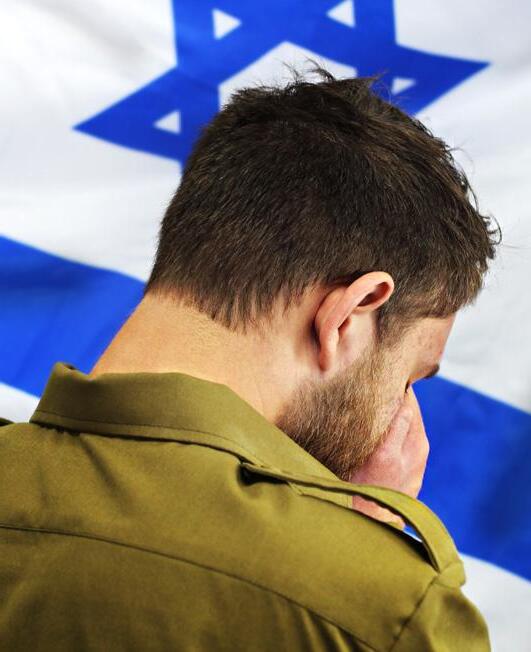
But this can only be made possible thanks to the support of generous donors here in the UK and around the world.
It costs £45,000 to breed, train and support a guide dog from birth until retirement and the Centre needs to raise 90% of this cost from donations. Half of the £36,000 cost of a PTSD support dog is currently covered by the Israeli government but the other 50% needs to be raised from donors. So every £ donated really does make a difference.
To make a donation please go to https://israelguidedog.org.uk/donate-now/ And for more information or to arrange a visit to the Centre in Israel email donorcare@israelguidedog.org.uk
Charity No 1188449


This year our competition seeks to highlight the innocent Israeli victims of the brutal October 7 massacre, and the resilience and defiance of Israel since that tragic day.
We need you to create a Sefer Torah cover for use on Simchat Torah
The winning design will be turned into a real Sefer Torah cover
The winner can give this cover to their school or shul at a special ceremony
The designs should be relevant to the tragic events of October 7 2023
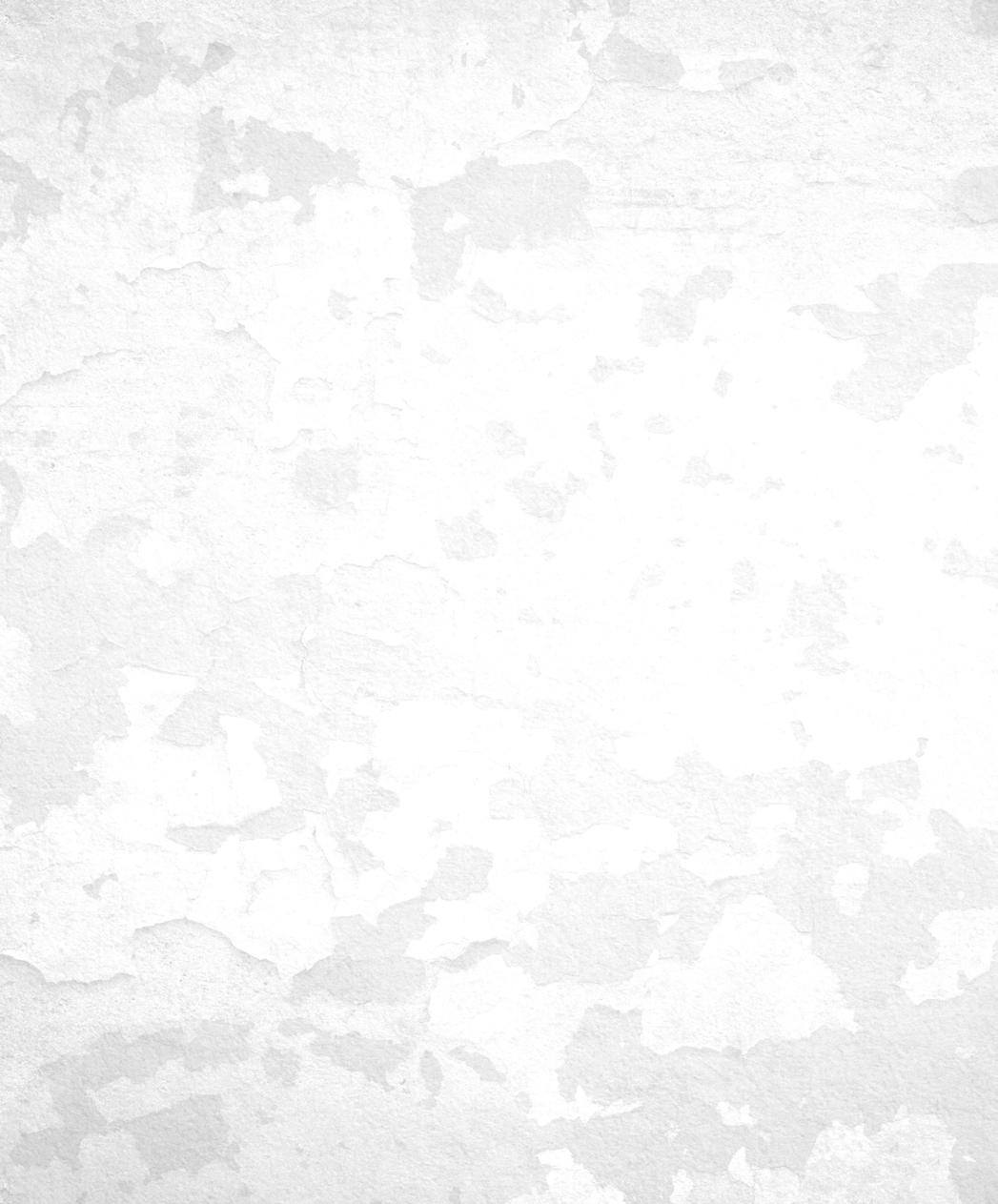
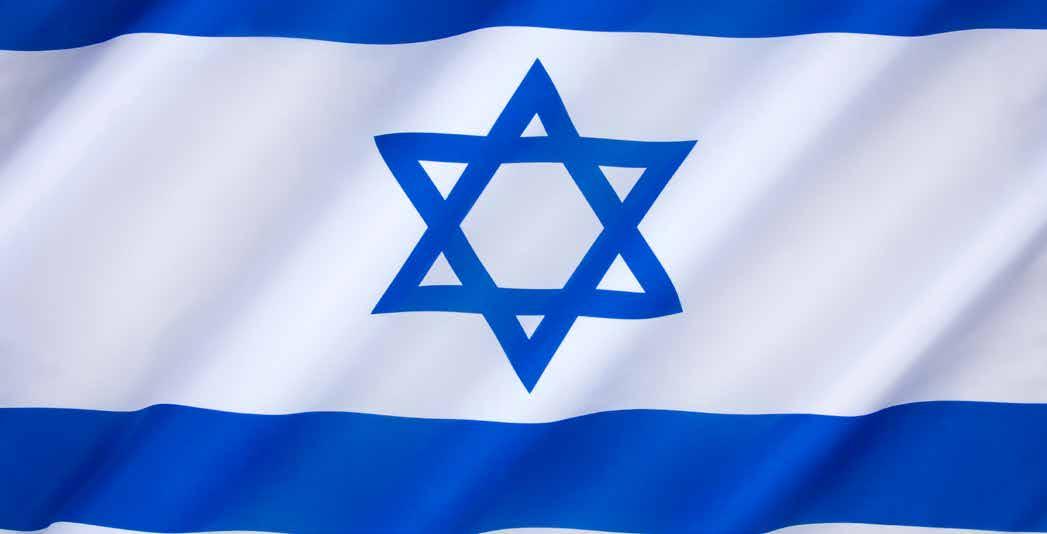

Our theme is Am Yisrael Chai and the safe return of the remaining hostages
The competition is open to students from Years 6-9. Entrants should apply via their schools or shuls
Design specialaSefer Torah cover to honour the victims ofOctober 7 2023
Send your entries to: office@yadvashem.org.uk
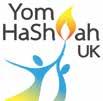
For decades, JNF UK has been the only UK Israel charity devoted to developing the Negev and building and strengthening new and existing communities, helping them to grow and thrive.
When the atrocities of October 7 occurred, JNF UK quickly pivoted its support to helping the Gaza Envelope communities that were hardest hit. Over the years JNF UK has built strong relationships with these communities, so our team on the ground knew exactly where and how to direct our support. We provided emergency aid to residents of over 20 of the Kibbutzim that were destroyed. We were also in contact with other partner organisations who were supporting some of the most vulnerable members of society including children and holocaust survivors in the form of respite activities and food packages. We are also proud to have initiated and launched the Ir Miklat project whereby over 4,000 disused communal bomb shelters in apartment blocks up and down the country were renovated so that the residents had a safe place to seek refuge from imminent rocket fire.
As six months have now passed since October 7, emergency assistance is no longer required but the people of Israel still very much need our support and we have pledged our unwavering solidarity. Our focus now is on healing, rebuilding,
and strengthening those impacted by the attacks.
Some of the most affected victims of October 7 are in desperate need of mental health services to aid in their recovery. These include Nova festival survivors, victims of sexual abuse and violence, and children who have been bereaved or orphaned. JNF UK is partnering with various organisations that are offering specialised mental health therapy and support for these victims who have suffered unimaginable trauma.
JNF UK is also offering continued assistance to displaced Gaza envelope communities. Since many of the communities cannot return to their homes, JNF UK is providing relocation assistance so the residents can adapt to their temporary locations until their kibbutzim are restored. We are also working to improve the lives of people who have returned to their homes to help them rebuild what was lost. Therapy is also being provided to promote both individual and community healing. Recently, JNF UK has been running various DIY projects for communities that were attacked on October 7. One such project was for Shlomit, a village located about 6.5km from the Gaza border. The youth from the Village joined together to build furniture for a future outdoor cafe that they envision as a gathering place for unifying and
strengthening their community, following the Hamas atrocities of October 7. The initiative gave these young people a feeling of ownership and control as they helped rebuild their community, which was attacked and which they were forced to evacuate for nearly five months.
Just as with the communities on the Gaza border, JNF UK has been supporting Israel’s Southern cities which have been under the constant threat of terror for decades. The residents of Ashkelon, the most targeted Israeli city have suffered unimaginably. To this end, JNF UK is supporting the Ashkelon Foundation which is providing rehabilitation programmes to the city’s schoolchildren who are experiencing high levels of anxiety and PTSD. Activities and workshops are being run, designed to help strengthen children’s emotional wellbeing and resilience.
Just as in the past, JNF UK is more committed than ever to its mission of rebuilding Israel’s peripheries and shaping a brighter future for the people of Israel. It will continue to support projects that help restore normalcy to the communities impacted by the conflict. JNF UK will look to rebuild and transform displaced communities so that they thrive, ensuring lasting solutions
for education, mental health, and overall well-being. JNF UK stands by Israel’s side now and always.
To learn more about the next phase of JNF UK’s vital work in Israel visit www.jnf. co.uk/israelunderattack
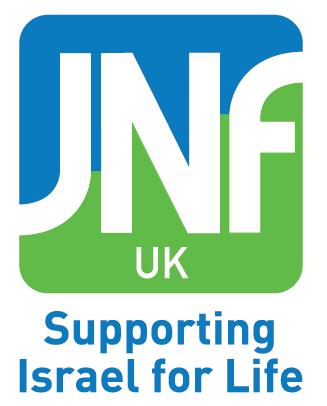


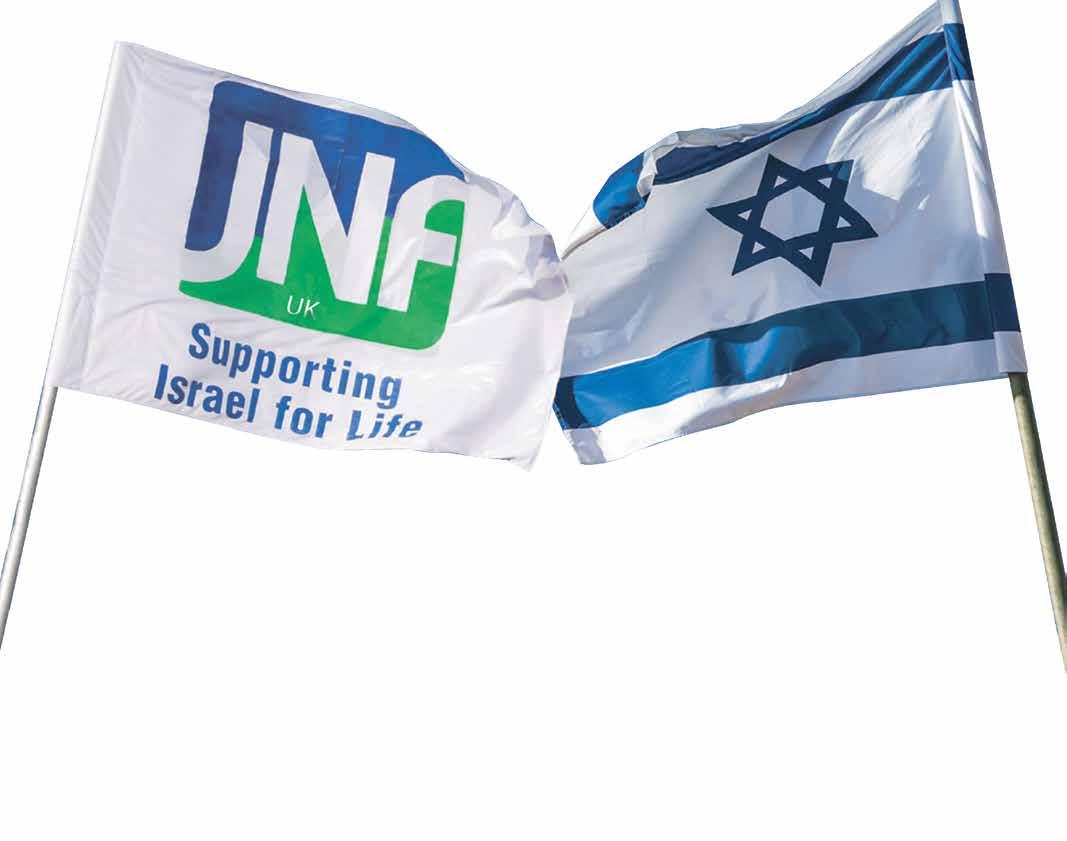
After six months of immense pain and suffering, JNF UK is committed to helping Israelis rebuild their homes and lives.
Your support could provide:
For orphaned children, survivors of the Nova festival, and victims of rape and sexual harassment who have all suffered unimaginable trauma.
Helping communities evacuated from the Gaza border to relocate as well as those who are returning to their homes to rebuild what has been lost. Therapy is also being provided to promote both individual and community healing.
Ashkelon is the most targeted city in Israel and its residents suffer unimaginably. Donations will help to run activities and workshops for schoolchildren designed to strengthen their emotional wellbeing and resilience.
Find out more and donate:
www.jnf.co.uk/israelunderattack
On Monday evening, StandWithUs UK proudly hosted its second graduating cohort of StartUp at JW3. The atmosphere was charged with excitement and pride as 22 students from Year 10 successfully completed the program. The event was not only a celebration of their achievements but also a testament to the dedication and hard work of the students.
Founded in 2022, StartUp offers UK teenagers the opportunity to develop leadership and team building skills whilst learning about the innovations coming out of Israel. Startup guides pupils in the UK and Israel to collaborate on producing initiatives to solve dilemmas through a variety of activities in education, and research, based on creative thinking through the message that Israel is a solution.
The final phase of the programme sees pupils use what they have learned to work in teams on a project that aims to bring the UK and Israel closer. The ideas ranged from social action, tackling misinformation, to technological advances.
The event ended with achievement prize, awarded to Mia Piperno, Ella Baddick, Rafi Mellish (all Yavneh College), Jake Tash (JFS), and
Sheina Cowan (Habs Girls).
The award-winning group will embark on an unforgettable journey to Israel next autumn in which they will visit Israeli startup companies and will have the opportunity to know Israel’s innovative landscape.
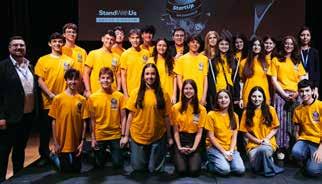
The winning project was ‘What a Wonderful World’, a project aimed to tackle misinformation about Israel and break down stigmas surrounding
it. The idea was to have a series of interactive white billboards that people across the globe could view and contribute drawings and words to which would foster connection and community.
Speaking about the 2024 StartUp programme, Mia Piperno, a member of the winning team said: ‘I have been able to channel my creativity and inspire other to initiate change.’ Professor Rosa Freedman, a parent of one of our StartUp graduates added: “StartUp helped my son rediscover his passion for Zionism.”
Want to join our 2024/5 StartUp programme? Applications will open for current Year 9 pupils on 1st June 2024. Find out more at https://www.standwithus.com/startup-uk

This past weekend, Seed organised a Weekend Away that attracted over 200 people for an unforgettable experience of community, spiritual growth, and family bonding. From the moment the weekend kicked off, it was clear that this wasn’t just an ordinary gathering but a celebration of shared values and connections.
Exclusively hiring the Woodland Grange Hotel, the weekend was complete

with attentive babysitters and entertainers; so whilst the youngest members were well taken care of, the adults were able to fully engage in huge variety of inspirational talks, fun activities and interesting sessions. With a 24/7 refreshment bar, and cocktails after Friday Night dinner, and a Sunday BBQ-style lunch, participants were full of praise for the event. One participant said “It exceeded our expectations and was a spiritual, uplifting and special weekend for the whole family”.
Rabbi Edwards, the organiser, said “the weekend was a tremendous synthesis of a great atmosphere, amazing food and a jam-packed schedule for both the parents and kids that engaged and inspired.” Seed’s mission is to enhance family life and strengthen Jewish identity from the inside out. They have top educators to deliver contemporary and relevant adult education programmes together with a range of family-friendly events. If you’re interested in learning more, visit the Seed website. https://seed.uk.net/
Finchley United Synagogue (Kinloss) have appointed Rabbi Dr Yoni Birnbaum and Rebbetzen Elisheva Birnbaum as the senior rabbinic couple.
Rabbi and Rebbetzen Birnbaum, who have six children, are expected to take up the post in September.
They began their rabbinical journey at Hadley Wood Jewish Community in 2010 before serving the Kehillas Toras Chaim in Hendon for a decade.
Rabbi Birnbaum serves as Director of Marriage Authorisation at the Office of the Chief Rabbi and Director of the Conversion Department of the London Beth Din. Rebbetzen Birnbaum is an Occupational Therapist. She will continue her professional work and support the Kinloss community including building women’s initiatives.
Rabbi and Rebbetzen Birnbaum are looking forward to building a “powerhouse of community life”.
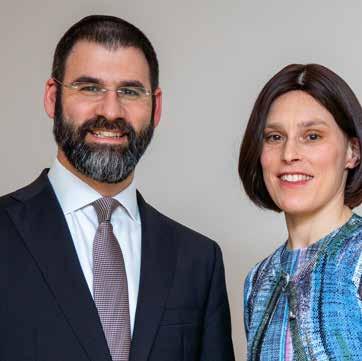
Last Friday the events team at Loughton Synagogue held their annual “Shabbat Loughton’ dinner for 100 guests.
The event has now become a regular in the Loughton Synagogue calendar following on from the national Shabbat UK that ran for several years. It’s always a sell-out event – and this year was no exception!
The evening started with a cocktails and canapé reception, followed by the Kabbalat Shabbat service held by Rabbi Yanky Abrams and further enhanced by the beautiful singing of Chazzan Anton Eriera.
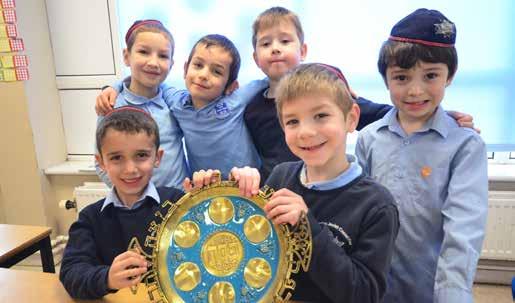
waiting list in Israel which provides essential therapies to severely disabled children.
The women were all invited to light Shabbat candles – after which a delicious Friday night dinner was served with wine – during which there was more beautiful singing by Anton.
There were plenty of L’chaim’s – as it has also now become a Shabbat Loughton tradition to offer all the guests whisky and toffee vodka shots throughout the evening!
A number of sponsors all helped to make the evening possible through their generous donations – helping to subsidise the price of the tickets.
the Malki Foundation UK.
They raised over £8,000 which will go towards reducing the Malki Foundation’s

Danny Myers ran his personal best half marathon, running it in just 1 hour 29.11 seconds.
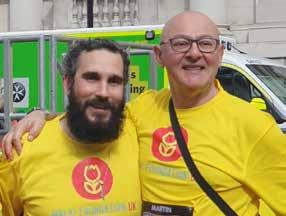

The London School of Jewish Studies is celebrating the 100th anniversary since a historic Speech Day address by Flora Sassoon.
Prof. Shalva Weil, a Senior Researcher at Hebrew University, will explore Flora’s fascinating life story at a centenary lecture on Monday where she will chart the colourful life of the orthodox Jewess who always travelled with her own prayer quorum of 10 Jewish males and personal ritual slaughterer.
Flora was the first woman to give a speech to graduating rabbis at Jews’ College.
Describing herself as ‘the first lady chairman’ of the annual speech day, her address on the 13th April 1924 included Talmudic insights.
Referred to as ‘one of the world’s most learned women’, Flora was a Torah scholar who studied with rabbinic tutors, wrote articles on Rashi and debated Jewish matters with the men of her generation.
Born in Baghdad to the well-known Sassoon family, she was a successful businesswoman, philanthropist and an esteemed hostess. Flora was also known to recite the book of Psalms each morning and was multilingual; speaking Hebrew, Aramaic, Hindustani, English,
French and German.
“Upon Flora’s move to England and subsequent rise to prominence, she viewed Jews’ College as the central place to spread Torah throughout the British Empire and create future Talmidei Chachamim”, said Joanne Greenaway, Chief Executive of LSJS.

Broughton Jewish year 2 children were given the exciting opportunity to join Rabbi Shmuli Brown in his Pesach Matzo Factory lesson on Tuesday morning. Children were able to separate the wheat from the chaff to make the Matzo flour.
“She stressed the importance of Jewish education and the Torah as the chief source which has kept Jews alive and sustained us at her annual lecture. Flora believed that as long as we were learning, no one could destroy us.”
“We are honoured that such a remarkable woman, who was ahead of her time in terms of female Jewish scholarship, is an important part of our history,” added Joanne. “We are proud to be continuing her legacy and the fact that LSJS is now at the forefront of both women’s and men’s learning.”
Details: www.lsjs.ac.uk or 020 8203 6427 or lsjsadmin@lsjs.ac.uk
The National Jewish Assembly (NJA) expresses deep concern over the recent survey findings published by the Henry Jackson Society, revealing alarming attitudes among British Muslims towards the Israel-Gaza conflict and broader social and political issues.
The survey, conducted by J.L. Partners for the Henry Jackson Society, uncovered startling results, notably indicating that only 24% of British Muslims believe Hamas committed murder and rape in Israel on October 7th. This finding is deeply troubling, as it suggests a significant gap in understanding or acknowledgment of the atrocities committed by Hamas.
Steve Winston, Managing Director of the National Jewish Assembly, expressed his astonishment over the survey findings, stating, “These results are deeply troubling and underscore the urgent need for concerted efforts to address misconceptions and promote mutual understanding among all communities. The alarming levels of sympathy towards Hamas and perceptions of bias against Israel underscore the pressing need for proactive measures to combat antisemitism and the forces at work who seek to undermine Western liberal democratic institutions.” Furthermore, the survey highlights alarming perspectives on the Israel-Palestine conflict, with only 24% of British Muslims acknowledging Israel’s right to exist as a Jewish homeland. This stands in stark contrast to the broader public opinion, where 57% recognise Israel’s right to exist.
Of particular concern is the substantial sympathy expressed towards Hamas among British Muslims, with 46% indicating more sympathy towards Hamas than Israel. This sentiment is compounded by the fact that a significant portion of British Muslims hold a positive view of Hamas, despite its designation as a terrorist organisation by numerous countries. Equally troubling is the perception of bias towards Israel in the media, with over half of British Muslims (52%) believing that the BBC is biased towards Israel. Additionally, the survey reveals a disturbing belief among almost half of British Muslims that Jews have too much power over UK government policy.
Taken together, these findings paint an extremely bleak picture of contemporary British society. The hostility and animosity towards Western liberal democracy values shown by the respondents to the survey indicates that the aforementioned views are no longer easily relegated to the “extremes,” but rather are becoming increasingly mainstream in the Muslim community.
The NJA emphasises the importance of addressing and challenging such attitudes, which not only contribute to tensions within British society but also perpetuate harmful stereotypes and prejudices against Jews. The NJA calls on political leaders, community organisations, and religious institutions to engage in proactive measures to combat antisemitism and to curtail Islamist extremism in the UK.
They were given a full lesson on how to make your very own Matzo.
Rabbi Brown is the Liverpool Universities Student Chaplain, and was once the Lubavitch Shaliach in the Ukraine, where he organised a large picture of the Lubavitch Rebbe.
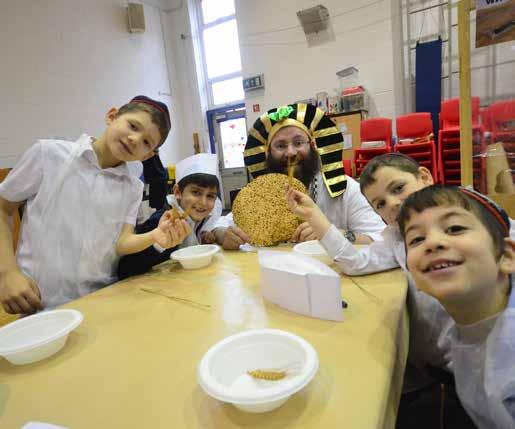
Emily Ben - Ze’ev from Emily’s Adventures in Wonderland has been inspiring children during the month of Adar .
Nancy Reuben in Hendon had a fabulous day of “ Explosions and Eruptions “ for the whole school . The highlight was definitely letting off a range of rockets ranging from balloon rockets to canister rockets as well as creating volcano eruptions .
Menorah Foundation enjoyed workshops on “magnets “ and loved all the magnet tricks and games as well as anti-gravity experiments . Great fun was had by all the children .
Darchei Noam unit in Menorah Grammar had a fabulous afternoon designing their own marble run games as part of their topic on , “forces”. The boys spent the afternoon constructing their own ramps and investigating how height and speed contributed to their success of getting their marbles into the cup . They had fun investigating friction by racing cars down ramps covered in oil , golden syrup and talcum powder . Finally, the boys made parachutes of different sizes and materials whilst investigating air resistance .

88 year old,


World Jewish Congress recently honoured European Commission for Values and Transparency Vice President Vera Jourova in New York.
Diplomats and Jewish community leaders attended a reception at the Loews Regency celebrating Jourova’s efforts to combat antisemitism and support Jewish life across the EU.
Jourov, WJC Vice President Maram Stern and US Federal Claims Court Judge Matthew H. Solomson spoke.
Stern expressed appreciation to Jourova’s “unwavering commitment” to the Jewish people, noting she has been a “steadfast ally” of the Jewish people and fight against antisemitism.
Stern thanked Jourova for ensuring security of European communities and championing their heritage.
“Your support in ensuring that Jews can openly express their identity without fear is truly admirable,” he said.
Jourova called for support of Europe’s Jewish communities following horrors of the October 7 terror attack in times of political polarisation.
“Such times are an opportunity for strengthened solidarity and mutual respect,” she said.
“We must protect the security and safety of Jewish communities in Europe
and worldwide. No one should have to hide their identity because they feel threatened.”
“We continue to be committed to remember, teach and research the Holocaust,” added Jourova, who called for everyone to be speak out against all forms of antisemitism.
“Holocaust denial, distortion and trivialisation fuels antisemitism and hatred and must be countered,” she said.
Jakub Kulhanek, Permanent Representative of the Czech Republic to the US, said Jourova was a “relentless advocate against antisemitism”, adding that she challenged antisemitism with “unwavering determination”.
The conflict in Gaza was a talking point throughout the evening.
WJC noted Jourová has led the fight against antisemitism and ensured Jewish communities across Europe are protected and empowered throughout her tenure.
Milestones include the appointment of Katharina von Schnurbein as the first European Commission Coordinator for combating antisemitism and fostering Jewish life in 2015, adoption of the EU strategy on antisemitism and Jewish life in 2021 and support of the IHRA definition of antisemitism.

any forethought. He took the lead in hand with the jack of clubs then led the queen of trumps, running it when West followed low. East won the king of trumps and returned a club. West ruffed this and exited safely with his remaining trump. As the cards lay, declarer could not avoid the loss of two diamond tricks, and had to finish down one.
At the other table, declarer noted that dummy’s nine of clubs suggested the lead being from shortage. Declarer saw that if it was a singleton and East had the king of trumps then he was in danger of losing four tricks – a trump, a club ruff and two diamonds. So, before touching trumps, he cashed the ace and king of spades and then ruffed dummy’s remaining spade with the jack of trumps. Next, he played ace and another trump to East’s king, unblocking his queen. The club return was indeed ruffed by West, but now that player was endplayed as he held a spade and five diamonds in the six-card ending. So, whatever West led at this point would allow declarer to hold his diamond losers to just one.
At the table, West played ace and another diamond. Declarer now claimed ten tricks: two spades, a spade ruff, three trumps, a diamond and three clubs.
(NB this plan would still succeed when West had king-third of trumps. If West began with the ace of diamonds there would be no club ruff. If he did not, the defence would take at most two more tricks - the ace of diamonds and a club ruff. If trumps had been 4:1 declarer would still survive if West had the ace of diamonds).

At both tables in a team game, the auction to 4♥ was identical. In both cases, South’s rebid of 2NT was a forcing enquiry and 3♥ promised a minimum hand with four-card support.
The ten of clubs was led at both tables. At the first table, the declarer played without Lead
 BY RAFI SMITH
BY RAFI SMITH
With the excitement of Pesach coming up, with all its special meanings and opportunities, the weeks leading up to Pesach and the Seder can range from being a little stressful to being completely overwhelming whether it be Pesach cleaning, organizing, preparing for guests, cooking or shopping. What may be coming up are feelings of being overwhelmed, anxious, fearful, tense, or dizzy (fill in your own version too) to the extent that one can even feel them in their mind or body, which apart from being uncomfortable, also inhibits our ability to actualize and function at our best. Some may find themselves resorting to soothing themselves with excessive screen time, binge eating, or just feeling more irritated and reactive. First of all, know you are not alone, and this is a common experience for many. But to help get through this period of time (or any similar situation), I will try to introduce some possible helpful tools.
Whilst listing everything we need to do can help dedramatize our fears down from ‘feelings’ to ‘reality’, seeing that long list can be quite triggering again. One effective tool is getting clear what needs to be done (cleaning), and what can be left for the meanwhile (organizing). Asking a Rav what needs to be done can also shorten your list. Next is spreading the tasks that need to be done over the next few days and scheduling them. Knowing that you’re doing the kitchen only tomorrow, can allow your mind to calm and focus solely on the task at hand. A nice mantra is: “Why worry about tomorrow’s problems today?”. On each day try your best to focus only on what needs to be done today, or even break the day down to smaller periods.
Staying Positive - Many people will look back at their day, and whilst they may be aware of their positive achievements, what they didn’t manage to do today will often stick out to them more. If we were to sit and list the things, we did did that day or morning, that would help keep us in a state of hopefulness and positivity, which really energizes and motivates us to keep going.

Self-Care –Whilst a 15-minute walk, a cup of tea, or enough sleep may be using up some of our precious time, caring for ourselves keeps us in a much calmer, focused, and relaxed place, allowing us to be far more productive and useful at the times where we really need to be productive, and also feel less burnt out after completing their tasks.
We may find that through these times,
our bodies are feeling tense or nervous without even being consciously aware of what we’re feeling. What we can do to ease this is to talk to our body in a soft reassuring way something like “It’s all going to be fine”, “Things will get done”, “You’re safe”. Listening to a self-compassion meditation will have the same effect too. By doing this, our brains can process that we are in a safe place and do not need our bodies to be in an anxious state. Breathing in and out slowly for a few minutes can be really helpful, just to slow our heart rate, allowing our minds to be out of ‘emergency mode’ and be in a more intuitive and thoughtful place resulting in us being way more effective.
For those with ADHD, long, unmotivating tasks can feel harder than climbing Everest. Things like listening to music, giving yourself incentives, and breaking tasks into smaller parts can help you feel way more effective.
Rafi Smith is a Clinical Counsellor/ Therapist, currently living in Jerusalem. For questions, feedback, topic suggestions or inquiries about therapy email emotionalhealing311@gmail.com, or call/ Whatsapp +972527160858

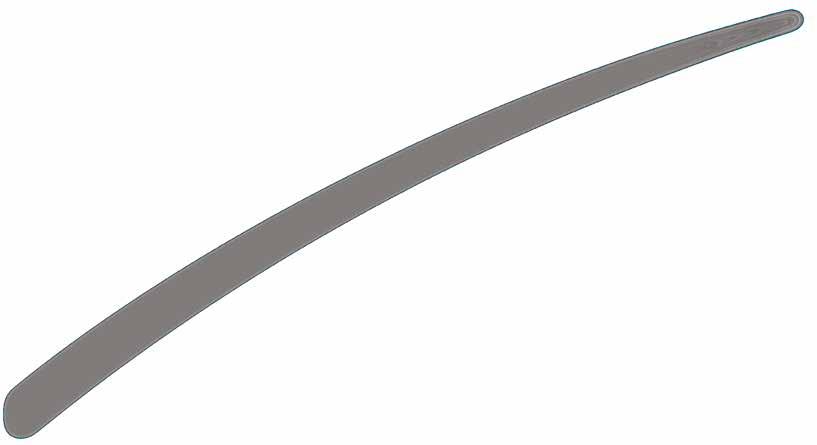

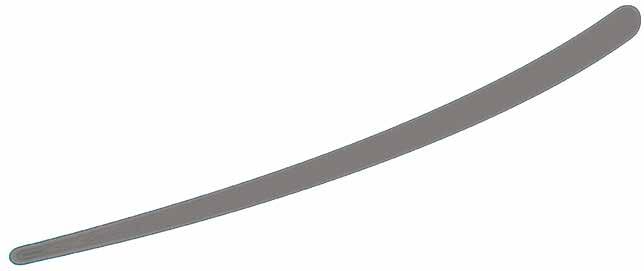






Looking for answers? Send your question to Rabbi@RabbiSchochet.com
Dear Rabbi
It’s been six months since October 7th. I feel so overwhelmed and I am filled with despair. It seems like we’ve regressed more than we’ve moved forward. This world has become an ugly place. I’m going to be frank. I am not a practising Jew but I was always proud about Israel. I have now reached a point where I am embarrassed about Israel and I am embarrassed to be Jewish.
Gideon
Dear Gideon
I’m reminded of the true story of a rabbi from the UK who went to Moscow soon after the collapse of communism. A young Russian girl visited him. “Rabbi! What do I do? All my life I never made a point of telling people I was Jewish. Yet now as I walk down the street people yell out against me ‘Jid, Jid.’” The Rabbi turned to her and said: “To be honest, if you hadn’t told me you were Jewish I would never have known. But me, with my black hat and long black coat and big black
beard, they probably don’t think I’m an Episcopalian. I look Jewish! So why do they yell ‘Jid, Jid,’ at you and not at me?”
Then he added: “They don’t shout against me because they know when they shout Jew against me I will take it as a compliment. But if they will shout it to you they know you take it as an insult.”
You see, regardless of our religious outlooks and even cultural variances we share a collective identity, a common narrative, a joint history and a mutual destiny. That is our biggest compliment. We need to enhance our identity. Because when we do, we will walk tall and proud and make no mistake about it, to reiterate what I have written before, the world respects Jews who respect themselves!
Jews identify for myriad reasons. In the past it was about religion. You identified as a Jew by your submission to the dictates and mandates of the faith. In later years it became more about culture, the giflte fish on Friday night and the matza balls on Seder night. For others it was limited to the liberal and fine arts, and in the post Holocaust era for many, Jewish identity became exclusively about Israel. We have all been influenced by our own narrative, our own experiences,

outlooks and lifestyle. But the bottom line remains: Every Jew is valued; every Jew counts. Every Jew is a diamond. Some shine on the surface, and some require some mining and polishing to reveal the facets and glow. But their value remains the same. Whatever your niche, it’s not how you identify but that you identify – and that identity has to be the catalyst which prompts you, in your own way, to make the world a better place.
Moshe Dayan once said, “For all that’s worth seeing in this wretched world, one eye is enough!” Nietzsche said something similar: “The world is beautiful but has a disease called man.” I say to you, while there seems to be some men with diseased mind-sets, ideologies and attitudes to life – of their own making – Judaism insists that the precise beauty of the world is made up of those who were made in the image of their Creator. The only difference between those who look to build and those who seek destruction – between those who love humanity and those who breed hatred lies in their perception of the world.

Dear Imelda
The ability to see beauty in the world is the beginning of our moral sensibility. What we believe is beautiful we will not wantonly destroy. Judaism says, open your eyes and appreciate that the world we truly desire can be won, it exists, it is real, it is possible, it is yours.
Dear Rabbi
I understand that a Seder is always a family event, where one celebrates with one’s family. What if someone lives alone and cannot get to a communal Seder? How do they make the Seder?
ImeldaFor a start no one should ever be left on their own for Seder night. Concessions are always available for those who cannot afford a communal Seder. For those who cannot for whatever other reason make it to a communal Seder, they should contact their local Rabbi or community who can certainly help make alternate arrangements for them with a family. That said, even if one is not connected to any community, often Jewish families in your immediate area could determine whether there is anyone on their own and look to accommodate accordingly. After all said and done, if one is unable to get out and has no one to join them, they should still conduct the Seder in its entirety, even reciting the four questions to themselves, drinking the four cups of wine etc. It is after all a celebration of our nationhood and therefore of direct relevance to every individual Jew. I hope you are able to sort something that suits your needs and wish you a happy and kosher Pesach.

020
£5,000 pcm
Gloucester Gardens, NW11
The property was fully refurbished just over a year ago has 5 bedrooms two of which are particularly large double bedrooms one of which also has an en-suite, there is a family toilet bathroom & another separate wc as well as a great hallway & utility room.
The ground floor also boasts a lovely hallway, large Kosher Kitchen with at least two of everything as well as an eat area. A fabulous sized dining room lounge, an office/playroom as well as a guest wc, garage & decent garden. Off Street parking for 3 cars the property is available now !
 BY RABBI SHMUEL REICHMAN
BY RABBI SHMUEL REICHMAN
The essence of life is growth and progress, as we strive to fulfill our true purpose. And as we explained in our previous article, the only way we can genuinely change, transform, and evolve is if we have the capacity to assert our inner will and to create a new reality within ourselves. This requires a complete re-creation of self within our consciousness — a remolding of our inner world. While yesterday we were the type of person who did one thing, today a new decision is formed and a new reality is created within our inner world. This requires a complete assertion of willpower, an overcoming of self, and a breakdown and reformation of inner drive and character. This means giving up who we are for who we want to be; sacrificing what we think we want for what we truly want. (See Rambam, Mishneh Torah, Gerushin 2:20, where he discusses the relationship between our true ratzon [“rotzeh ani”] and our lower self.) It means overcoming the emotional and overwhelming pull of current desire and generating a new “want” within our very core. This is why the Rambam places his seemingly philosophical discussion of the concept of free will amongst the halachos of teshuvah; free will is the very root and foundation of Hilchos Teshuvah. Without free will, one could never change and one could never become something else, someone new, and someone better.
Strikingly, Rav Eliyahu Dessler explains that many people never experience a true assertion of their free will due to its immense difficulty. This is why many people do not change. Change is hard, uncomfortable, and often requires sacrifice. One must fully and wholeheartedly believe in their new future in order to give up their current lifestyle. However, when we push with all our might, expressing a full force of our inner will, we get a taste of truth, an experience of destiny, and a glimpse of our true self.
However, this understanding of teshuvah, namely, that of return, has an even deeper layer to it. After all, if teshuvah is an act of return, what or whom are we returning to?
Genuine teshuvah is not just about fixing our mistakes in Elul and Tishrei; it’s about self-expression, returning to our true and higher selves. As we previously discussed, while we were in the womb, we were in a perfect and transcendent state of being, and a malach taught us kol haTorah kulah (Niddah 30b). As the Vilna Gaon explains, this refers to the deepest realms of Torah, a transcendent Torah that lies far beyond this world, beyond the confines of space and time. (Quoted in Maalos HaTorah by Rabbeinu
Avraham, brother of the Vilna Gaon. See also Even Sheleimah 8:24.) This Torah is the very root of reality, and you were granted complete understanding of its every detail. Not only were you shown this level of Torah, but you also learned your specific share of Torah; you were shown your unique purpose in the world and how your unique role fits into the larger scheme of the human story as a whole. You were given a taste of your own perfection, of what you could, should, and hopefully will become. And from this transcendent realm, you were birthed into the physical world with the mission to actualize everything you were shown in the womb while in your primordial, perfect state.
In essence, your job in this world is not to create yourself but rather to recreate yourself; to re-attain your original state of perfection, as you were shown by the malach. This time, however, it must be done through free will, i.e., by choosing to become great. Only by overcoming challenge and difficulty, and only by asserting your willpower, can you fulfill your true potential. In essence, our entire life is a story of teshuvah — returning to our original, higher, true self.
This theme is the mystical root of creation itself. All of existence is meant to return to its original true, higher form. When Adam was created, his mission was to return to his root and source, i.e., Hashem. When Adam sinned, all of existence fell; our goal became to return the world to its higher form and repair a fractured world. In essence, our goal is threefold: to return to our individual higher selves, our collective higher selves as a nation, and our absolute root self — Hashem.
We can now return to our original question regarding how to stop the downwards momentum of failure and bad decisions. The answer is a simple, single-word answer: decide! Choice is the most powerful tool Hashem has granted us. The power of choice allows us to accomplish anything. When life begins to fall apart, and bad decisions start piling up, we must cut off the downward momentum before it grows out of control and before it destroys us. The key is making the decision, asserting your inner will, and focusing its full force toward cutting off the momentum. If you can stop the momentum of bad decisions, of a lifestyle that is draining the life out of you, you can stop it from spreading. With nowhere to spread, negativity is like a flame without oxygen; it simmers out and disappears. It all starts with a single decision to turn the tide — to begin building positive momentum, to start climbing uphill, and to start heading toward your ultimate destination. If you can take that first step and push toward your greatness, you will suddenly begin riding that new wave. This is the power of choice; this is
the power of positive momentum.
The single most important psychological factor involved in this decision is our response to failure. When we fail, we often become convinced that we are a failure. We believe that by making a mistake, we become the mistake. We integrate past experience into our present identity, and we therefore lose faith in ourselves, our hopes, and our values. As a result, we begin to cascade downwards, sliding with negative momentum.
The key to avoiding this slide is to disconnect our failures from our identity. We all fail; we all have times where we give in to temptation and do things that we regret. But failing does not make you a failure. It makes you human, a work in progress; someone who is growing and learning. If we learn to view our failures as learning opportunities and as wakeup calls, instead of perceiving them as crippling obstacles, we can use them to grow and improve. When we make a bad decision, we cannot let ourselves get depressed. Regret and remorse are essential, but we cannot get lost in these feelings. They must be used in a healthy, balanced, and positive way. When we slip up, take a step backwards, and fall down a notch, we have to immediately stop the downwards movement, pick ourselves back up, learn from our mistakes, and continue our upwards climb. This is the character of one who has a growth-mentality — one who does not get crushed by life, but learns from it instead.
It is therefore no surprise that the Torah is replete with lessons of the importance of will and the power of decision. An opinion is quoted in the Gemara (Rosh Hashanah 10b) that man was created in Nissan. Why then do we celebrate Rosh Hashanah in Tishrei? Tosafos suggests that although Hashem created the world in Nissan, His decision to do so took place six months earlier on the first of Tishrei. The decision itself serves as a form of creation, which is why man is considered to have been created in Tishrei.
The Gemara (Kiddushin 49b) rules that if a man marries a woman on the condition that he is a tzaddik (righteous), we consider the marriage as halachically binding — even if he is wicked! How can this be? The Gemara explains that perhaps he had decided at that very moment to do teshuvah (hirhurei teshuvah) and to become a tzaddik, and that intention itself would be enough to validate his statement. Based on this possibility, we must view his marriage as possibly binding. This example, once again, displays the spiritual significance of a decision.
There are applications of this idea regarding Shabbos observance as well. If
one is outside a city on Shabbos, he cannot walk further than two thousand amos from where he is located at the moment Shabbos begins. However, the Mishnah in Eruvin notes that if one is in the midst of traveling right before Shabbos begins, he can point into the distance and say that he intends to be at that place in the distance, and his two thousand amos will be measured from that point. Essentially, halachah recognizes us to be in the place where we want to be; where we decide to be.
Free will — choice — is the root of teshuvah. Teshuvah is about reengineering our will, recreating our desire, and rewiring our wants. It’s about the decision to be better, to be great, to become our best and truest selves. As the Ramchal explains in Mesilas Yesharim, if you change what you want (akiras ha’ratzon), you change who you are. When you make a new decision, you create a new reality for yourself. When the shofar blows this year, let us truly awaken. In some sense, we all need a shofar for the shofar; we need a wakeup call to listen to this year’s wakeup call. Many are numb to the wordless blast; deaf to its existential calling. Some have given up on change, while others are too busy with life to stop and truly consider the possibility of more, of a greater life. May we all be inspired to fully utilize this idea, to embark on a journey of genuine teshuvah, and continue the process of becoming our ultimate selves.
Rabbi Shmuel Reichman is a bestselling author, international speaker, and the CEO of Self-Mastery Academy. He has lectured internationally on topics of Torah thought, Jewish medical ethics, psychology, and leadership. His bestselling book, The Journey to Your Ultimate Self, serves as an inspiring gateway into deeper Jewish thought. He is also a business, executive, and leadership coach, with a unique approach based on Torah values. After obtaining his BA from Yeshiva University, he received Semicha from Yeshiva University’s RIETS, a master’s degree in education from Azrieli Graduate School, and a master’s degree in Jewish Thought from Bernard Revel Graduate School. He then spent a year studying at Harvard as an Ivy Plus Scholar. He currently lives in Chicago with his wife and son where he is pursuing a PhD at the University of Chicago. To enjoy more of Rabbi Reichman’s content, to contact him, or to learn more about his services, visit his website: ShmuelReichman.com


“And Hashem spoke to Moshe and to Aharon, as follows: ‘If a person (“adam”) will have on the skin of his flesh a swelling or a rash or a discolouration, and it will become on the skin of his flesh a tzara’at affliction, he shall be brought to Aharon the Kohen or to one of his sons, the Kohanim’” (Vayikra 13:1–2).
The major focus of this and next week’s parshiot is tzara’at – a form of leprosy which was a physical manifestation of a spiritual malaise, primarily caused by slander. Other reasons given for tzara’at are haughtiness, selfishness and social sins.
One would assume that tzara’at could only afflict adults, who can be held responsible for their actions. However, the Mishnah (Niddah 5:3) teaches us that a newborn child who is only one day old is already susceptible to tzara’at. The Gemara (Niddah 44a) explains that this is derived from the word “adam” in the verse above, meaning any person, regardless of age.
How can we understand the tzara’at of a baby? After all, babies do not have the capacity to speak, let alone slander or commit social sins. Why would a baby be
their owners, so it is with an affliction that appears on the forehead of an innocent child. It is a warning that shocks the hearts of its parents to come and scruti-

afflicted with tzara’at?
Rav Shimshon Raphael Hirsch explained:
“Just as an affliction that appears on a garment or house is a warning sign to
nize their deeds…
“The mark of affliction on their child’s body, the declaration of impurity and its consequences, are a harsh warning to its parents: Improve your deeds for your

1ST ALIYA (KOHEN)–VAYIKRA 12:1-13:5
After childbirth, a woman would wait several weeks before bringing an elevation offering (olah) and a sin offering (chatat). A baby boy is circumcised on the eighth day after birth, even if that falls on a Shabbat (Talmud Shabbat 132a).
G-d told Moshe and Aharon that someone whose skin appeared to indicate a particular type of skin disease (tzara’at) would have to show the blemish to a Kohen. The Kohen would evaluate and decide if the affliction was clearly tzara’at, thus rendering the person impure (tameh). If the case was unclear, the Kohen would quarantine the person for seven days.
2ND ALIYA (LEVI) – 13:6-17
After the first period of quarantine, the Kohen would re-inspect the blemish. Sometimes a second seven-day period was necessary. Eventually the Kohen would declare whether the person was tameh or tahor (pure).
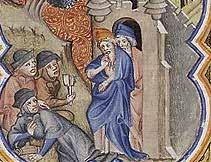
3RD ALIYA (SHLISHI) – 13:18-23
Even if a wound looked like tzara’at, it could not be judged as such until after it was fully healed and the normal inspection procedure by the Kohen had been carried out.
4TH ALIYA (REVI’I) – 13:24-28
It was also possible for tzara’at to develop from a burn. However, a burn and a blemish that were adjacent to one
another could not combine together to form the minimum size needed to render an affliction as tzara’at (Rashi).
5TH ALIYA (CHAMISHI) – 13:29-39
Tzara’at could erupt on the scalp or on the beard area, causing a loss of hair. The signs of affliction were two golden hairs appearing after the onset of baldness (Rashi).
6TH ALIYA (SHISHI) – 13:40-54
A slightly different form of tzara’at is detailed, which caused a more substantial loss of hair. A metzora (one who has been contaminated with tzara’at) was sent outside of the camp and had to tear their garments.
7TH ALIYA (SHEVI’I) – 13:55-59
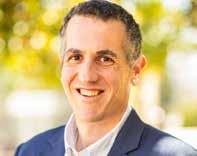
children’s sake. Be decent for the sake of your children’s future!” (R’ S.R. Hirsch’s commentary to Parshat Tazria).
It is important for parents and educators to know that improper speech does not only impact the person speaking and the person being spoken about, but the children of the slanderer as well. From the day they are born, our children are influenced by the atmosphere in which they are educated and nurtured. Tzara’at of a baby is not a punishment for its parents’ actions, but a natural consequence of the environment it is exposed to.
If our own fate is not enough to motivate us to scrutinize our deeds and improve our ways, we should act for the sake of our children and the example we set for them.
Rabbi Danny Mirvis is Acting CEO of World Mizrachi, and Rabbi of Ohel Moshe Synagogue in Herzliya Pituach. Rabbi Mirvis will be joining for the Weekend of Inspiration - Shabbat 17/18 May ‘24
Tzara’at could also infect clothing. A suspected garment was set apart before the Kohen made a ruling about whether it was tameh. If it was declared tameh, the garment was burnt.
Point to Consider: Why are items of clothing (and indeed people themselves) no longer affected by tzara’at? (see Ramban’s commentary to 13:47)
(MALACHIM II 4:42-5:19)
Today’s haftarah contains the story of the mighty Aramean general Na’aman, who was afflicted with tzara’at. An Israelite woman, taken captive and working for Na’aman, advised him to seek a cure for his tzara’at from the prophet Elisha, who told him to bathe seven times in the River Jordan. Na’aman was insulted at the suggestion (“we have much greater rivers”, he said), but his servants persuaded him to do so, and he was cured. Na’aman understood that G-d was communicating with him, with the affliction and its cure.


HELPED OVER 6,000 OLIM
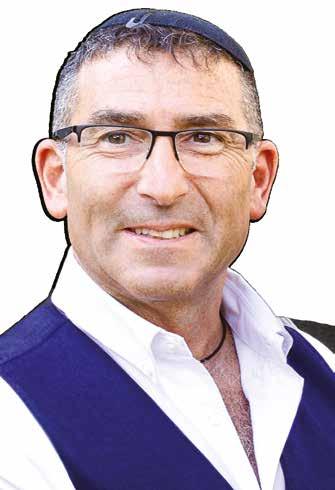
INDEPENDENT ALIYAH CONSULTANT
Looking to Live or Invest in Israel?
We have you covered!
Ashkelon
Bet Shemesh
Carmei Gat
Herzliya
Jerusalem
Modiin
Netanya
Ra’anana
Rehovot
Tel Aviv
Tel Mond
Zichron Yaakov
SCHEDULE YOUR FREE CONSULTATION



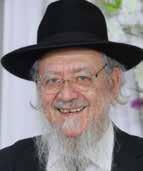 BY RABBI YAKOV SCHONBERG
BY RABBI YAKOV SCHONBERG
As we start perek Hazahav, we enter the world of financial instruments in halacha. In recent years there have been major changes in monetary systems moving towards digital currency and we shall attempt to apply the principles established by our sugya to the new situations.
The mishna (44a) sets out the basic principle: “Gold acquires silver, but silver does not acquire gold!” In order to solve this enigmatic statement one has to understand the dynamics of the variables in monetary transactions. On the one hand, merchandise fluctuates in value according to supply and demand, and the movements are measured against fixed money values. On the other hand, money itself in the form of gold and silver is also subject to rises and falls according to market forces. A monetary system allowing price-fixing requires a trusted item to be utilised as a standard against which all commodities are measuredusually gold or silver. If gold is adopted as the standard, then silver coins and other commodities will be priced relative to gold coinage, notwithstanding any fluctuation in the value of gold itself. Gold is regarded as fixed and any variation of value is reflected in the price of the commodity. Our gemora uses the terms אעבט, money, and ירפ, merchandise, to express this relationship. Monetary payment in itself is not recognised as creating a binding purchase transaction in halacha and therefore it is important to recognise whether the consideration used in a purchase transaction is categorised as money or commodity to establish whether the transaction is binding. “Gold acquires silver” tells us that gold is regarded as the commodity, as it effectively acquires silver, but then “silver does not acquire gold” because silver must be money and cash cannot act as a kinyan. This rule therefore establishes a silver standard.
The gemora relates that when Rebbi taught his son R’ Shimon this mishna, his son challenged him that in his youth Rebbi had taught the reverse, that silver acquires gold – a gold standard, but Rebbi does not respond. The gemora explains that in his youth Rebbi reasoned that
since gold is more valuable, it ranks as money, whereas silver, which is of lesser value is regarded as merchandise. The gemora then relates that R’ Chiya also regards gold as money, for Rav once borrowed gold dinarii from R’ Chiya’s daughter and when he came to repay, he asked R’ Chiya if he was permitted to repay with gold dinarii coins, despite gold having increased in value in the interim, and the increased value may constitute payment of ribbis. He permitted it, which indicates that he considered gold as money which is constant in value. The gemora rejects the proof, as ribbis concerns do not apply if Rav himself had possessed gold dinarii when he incurred the debt.
It is surprising to find that Talmud Yerushalmi has preserved the earlier version of this mishna: “silver acquires gold”, as Rebbi taught in his youth. In fact, this perek is called ‘Hakesef’ in Yerushalmi rather than ‘Hazahav’. Yerushalmi explains that we have R’ Shimon’s version of the mishna because he argued that it was correctly formulated when Rebbi was strong. Bavli but does not mention the implied weakness in Rebbi’s old age when it reports the dialogue with R’ Shimon. Bavli provides justification for Rebbi’s retraction of his earlier view. In his youth, Rebbi considered that gold was held in greater esteem because of its higher value and its importance in relation to silver makes it a better choice to be regarded as having fixed value as money. In his old age, Rebbi adopted the alternative version of this mishna based on the situation that silver coins were more current; they circulate more easily and are readily acceptable as a medium of exchange by merchants. Thus, Bavli accepts Rebbi’s revision in his old age but Yerushalmi remains with the original version.
Although our gemora tries to present proofs that subsequent authorities reverted back to regarding gold as money, it rejects these attempts and the outcome of our sugya establishes that silver is regarded as money in relation to gold. Tosafos here appears to follow R’ Shimon lehalacha, that gold is regarded as money, as does Sefer HaIttur, but most Rishonim and Shulcan Aruch (CM-203:4) pasken in accordance with the view of Rebbi in his old age. We need to address the question: what made Rebbi reverse his earlier view? What happened in his older years that altered his perception of money from something more esteemed to what was more current?
DATING THE CHANGE
It is generally accepted that Rebbi was born around 135CE and that he died around 219CE, so he may have been considered old from age 60 in 195CE. Eretz Yisrael under Roman dominion utilised Roman currency where 25 silver dinars were equivalent to 1 gold aureus (in Latin aurum=gold). It should be noted that although our gemora refers to golden dinarim, Roman dinarim were exclusively silver (the first gold dinar was minted by Muslims in 680). Therefore, we must understand the gemora as translating ‘aureus’ literally as ‘golden’ (like the European Gulden) – zehuvim – and calls them ‘dinrei’ to indicate that it is a coin. Coin experts inform us that between the years 193-196CE, ten times as many silver coins were struck as previously, boosting the number of silver coins in circulation exponentially, leading to high inflation. The ‘antoninianus’ silver coin introduced by Caracalla in 215CE was also valued at 25 to the gold aureus and that overvalued its lower silver content. As time progressed, silver coins contained less and less silver, until by the end of the third century they were just silver washed – similar to silver plating. Silver bullion supplies began running short because the Roman Empire was no longer conquering new territory, the Iberian silver mines had been exhausted, and a series of soldier emperors and usurpers needed coin to pay their troops and buy their loyalty. The face value of silver coins greatly exceeded the value of their silver content, but as legal tender, they were in much demand. Because their circulation increased substantially, they came into common usage and had more everyday use than previously when they had a higher silver content. This is counter-intuitive, as one would have expected that people would have less confidence in the debased coin and for it to be less popular. However, the concept of legal tender provides comfort for people to accept coins at face value despite the lower silver content, as we have seen in more recent times. Thus, silver coinage with almost token value established itself as the prime currency unit because of its extensive usage. Perhaps this new situation is what influenced Rebbi to regard silver as money, foreseeing widespread use of token currency as a future basis for monetary systems. This would be the meaning of the gemora saying that he considered silver more current.
The gemora brings a baraisa stating that a silver dinar is one twenty-fifth of a gold dinar. [Parenthetically, Tosafos asks how can this ratio of gold to silver of 1:25 be double the ratio of 1:12 prevalent in his time (actually, 1:12 was the ratio set
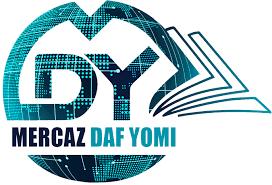
by the Roman Empire)? Tosafos answers that the gold dinar had twice the weight of the silver dinar, and this is borne out in the chart above where the aureus weighs twice as much as the denarius, even if it is the same size. This assumes the coins have the same level of purity, which we have seen was not the case. Today the ratio is around 1:85!] Returning, the gemora states that this ratio relates to the law of pidyan haben, but it would only be relevant if gold is אעבט. Since the value of silver fluctuates, the baraisa fixes the value of silver in relation to gold which is considered constant. Rabbi Moshe Feinstein (IM-YD1:189) writes an interesting teshuva dated 1923, when Russia switched to a gold standard, that since our gemora links pidyan haben to the value of gold, and gold was now אעבט in Russia, henceforth one needs to adjust the shiur silver according to the value of gold based on the ratio in 1923. The quantity of silver would thus vary according to time and place. This pesak has not been accepted. Seemingly, Chazon Ish disagreed, as he writes (CM-16:1) that the five shekalim fixed by the Torah for pidyan haben represents weight of silver, as originally shekalim were weights rather than a monetary system.
Having discussed monetary systems in the time of the Mishna, we need to consider the implications for present-day systems. Modern economies no longer adhere to gold or silver standards, want to abolish cash, and utilise electronic transfers and cryptocurrency. How are the new systems viewed in halacha? Are bitcoins considered money or are they regarded as a commodity so that payment with bitcoins can effect a kinyan?
To be continued….
Rabbi Schonberg was born in London in 1948 and attended Avigdor, Yesodei Hatorah and Hasmonean Schools. He attended Manchester, Chaye Olam and Gateshead Yeshivos. He qualified as a Chartered Accountant in 1972 becoming a partner at Cohen Arnold and was there in total for 42 years, retiring in 2009. Actively engaging in the Jewish community, he was treasurer of Kedassia Kashrus and is still Trustee of its holding charity UOHC Foundation. He served on Kedassia, Burial Society and Executive Committee of UOHC. He is also a governor of Yesodei Hatorah Girls School. He founded Aguda Book and Tape libraries and sefarim gabbai at Tottenham Adath. He retired to Ramat Beit Shemesh in 2009 and was foundational member of Mercaz Daf Yomi.
To find out more, you can sign up at mercazdafyomi.com and receive a free gemoroh.

Tzaraat (often mistranslated as “leprosy”) is a supra-natural illness which also can afflict garments. If white or pink patches appear on a person’s skin (dark red or green in garments), a kohen is summoned. Judging by various signs, such as an increase in size of the afflicted area
after a seven-day quarantine, the kohen pronounces it tamei (impure) or tahor (pure).
A person afflicted with tzaraat must go and live alone outside of the camp (or city) until he is healed. The afflicted area in a garment is
B A C C L O T H E S H H
J B P L S A U S G E D A
F K E F A L C E O L Y F
Q W S R H M S D X P S V
L L A U U C M O Y N A J
Q Z C L Y P V H E R Q P
T O H T L X M C N S Y V
O N Y O F S K I N H P B
R I L Y B C T B I R C R
S W M M O B G S T X L A
F K N H F G U P H L J Q
C K H H W E A K V R X Z
removed; if the tzaraat spreads or recurs, the entire garment must be burned. Tzaraaat is a message from Hashem to wake up and do teshuvah. We don’t have it today but we still can’t speak lashon harah. We must be evry careful what we say. Hashem is listening and if we say
bad things about others, we will get punished. But every time we say nice things, we’ll get rewarded! And did you know, that for every second that you want to say something mean and you don’t, you get reward?
Number of Lines - 128
Number of Verses - 67
Number of Words - 1,010
Number of Letters - 3,667
This week’s Question: Caterers get a holiday during the ‘Counting of the Omer’ and the ‘three weeks’. When do they take an entire month from:
1) Bar Mitzvahs (but not Bat Mitzvahs)?
2) Bat Mitzvahs (but not Bar Mitzvahs)?
3) Bar and Bat Mitzvahs?
Last week’s Answer: There is a day in the Jewish Calendar One day every year, a Halacha of Shabbat is different than the rest of the year. What day is it?
The Shabbat during Sukkot. On Shabbat it is forbidden to carry from a “private domain” to a “public domain.” Usually, a private domain must have at least three walls. On the Shabbat of Sukkot, however, a private domain can have less. Why? A Sukka is valid with as few as two walls, plus a post as the third wall. Since such a structure is a valid Sukka, therefore, it’s also considered a private domain.
Email your name, age, where you live and the answer to office@thejewishweekly.com! Next week’s paper will feature the answer and will mention one person who gave the correct answer!
Using all the shapes, can you make the shape on the right?
The goal of a word wheel puzzle is to create as many words possible with the letters in the word wheel. Each word must contain at least three letters. You can only use each letter once and every word must have the letter in the centre of the wheel.
Last edition’s words
Here are some words you may have found from last week – you may have found more!
Use the area below to write the words you have found.
ape hen hep hie pea pen pep pie sea she apes apse heap hens hies nape neap pane peas pens peps pies pine pipe sane seas sine anise apses ashen ashes aspen heaps napes panes penis phase pines pipes sepia shape shies shine snipe spies spine anises aspens happen pepsin phases sepias shapes shines snipes spines happens hessian hipness nappies pansies happiness
Q: What animal is always at a game of cricket?
A: A Bat!
Q: What is a tornado’s favourite game to play?
A: Twister!
Q: What time is it when the clock strikes 13?
A: Time to get a new clock!

Why won’t my Israeli bank just accept my money?
As many in Israel are quick to learn, an ounce of paperwork prevention can be worth a pound of cure; especially when it comes to saving precious money, time, and hassle on your overseas currency transfers. It wasn’t too long ago that transferring currency to Israel and exchanging to shekels was a pretty easy and pain free process. You would instruct your bank overseas to wire your money, your Israel bank would accept the funds, and automatically release them to be converted. End of story.
However, starting approximately 5 years ago, the pendulum has swung to the complete opposite end of the spectrum and into the “endlessly frustrating” classification. Over time Israel’s banks have become more difficult to deal with (as if that was possible), including excessive scrutiny with regarding source of funds being transferred, leading to the most common question we receive on a daily basis: Why won’t the bank just accept my money!!!???
The scenario typically plays out in an all-too-familiar way, and complications can arise on virtually any amount being transferred no matter how large or small. As such, it really does pay to plan ahead and gather supporting documentation before making any transfer. Believe us, you’re going to need it, especially once your funds arrive from overseas and the bank refuses to accept them until you satisfactorily answer their entire litany of questions including:
Where is the money from?
How did you get to have so much money?
Prove to us you have paid tax on the money.
Why do you need the money in Israel?
Prove it, prove it, prove it – and send it to us by fax!
Pretty invasive to say the least, and if you’re unable to satisfy their demands, they may freeze your money, or in some cases return the funds, where you may incur international transfer and receiving fees. Imagine if these funds were going towards the closing on a property purchase and you needed them right away. Talk about making a high anxiety situation much more stressful…
To bo continued...
Eytan BennettMARTIN HEIMAN – SMARTINET
We’ve been providing businesses with all of their communication needs since 2010. We specialise in supplying businesses with VoIP Packages, Mobile Plans, Broadband, Card Merchant Services, Leased Lines, On-Hold Marketing, and Call Centre Services. Smartinet, your reliable and efficient business communications provider.

Contact: 0333 613 0000 connect@smartinet.co.uk smartinet.co.uk

MARTIN FRYDENSON - ROUNDTREE REAL ESTATE
Roundtree Real Estate are your local experienced Estate Agent having been established on the High Street since 2009. We are both ARLA and NAEA Propertymark regulated and we are here to offer you expert advice in Property Sales, Lettings, Commercial and Full Management Services, covering Hendon, Golders Green, Finchley, Colindale and surrounding areas. We have built long standing relationships with all our clients and should you have any property related queries please do contact us.

Contact: 020 8203 2111 mail@theroundtree.com www.theroundtree.com

ALIYAH ADVISORS - GARY BROWN - PRACTICAL ALIYAH ADVICE

meeting will allow Gary to advise on who you need to speak with for each requirement and when in the year you should approach them. Confidentiality assured.

Contact: +972 (0)2 372 3775 / +44 (0)20 3 989 5080 info@aliyahadvisors.com aliyahadvisors.com/aloh-naaleh/


Contact: 020 8922 2222 helpline@jcare.org www.jewishcare.org




After a couple of years of mediocre service from other brokers, I tried Lifepoint. They were extremely attentive and supportive of our company’s needs.
They saved us over £60K! Their care didn’t end with the deal. The whole team continues to support the company and employees directive with quick, kind service. Can’t recommend more!


